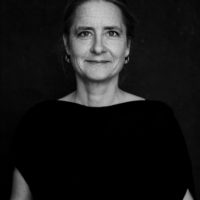Distinguished
Reporting
Award
René Damgaard Is Saying a Final Goodbye to Life and to His Niece
published by Politiken, Denmark
To view the translated publication in scrollytelling format, please visit this link. Also find the full text and photos below.
René Damgaard, 67 years old, lies in a hospital bed in the Palliative Care Unit at Hvidovre Hospital. It’s the first evening of May, and the window is open, letting in mild air and the sound of a blackbird singing into room 14.
»This is the kind of weather you love the most. When you usually stand and fish at the sandbank,« says his niece, 53-year-old Mette Damgaard. She is leaning over the bed, her face very close to his. She has been sitting like this for a long time.
René Damgaard has his eyes closed, and his mouth is slightly open. The evening light falls across his gaunt face, and he looks as though he is sleeping. He is not, but he is dying.
»I will take care of you«, Mette whispers.
He nods. She strokes his hand and squeezes it.
»You can let go now, René«
There is a moment of silence. Then he whispers:
»Remember to say goodbye to everyone from me«.
»I will, René. I promise«.
Total pain
The way we die is a topic of a heated debate in Denmark. The government wants to introduce medical aid in dying and last year set up a committee, which has just presented their various opinions. Palliative care is often highlighted as a counterweight to the possibility of aid in dying. To describe the treatment terminally ill patients, Politiken was given access to the Palliative Care Unit, section 126, at Hvidovre Hospital for ten days in April and May 2024
Unlike the rest of the hospital, Section 126 isn’t focused on cure, but on relief. In this unit, terminally ill patients like René Damgaard receive help to meet their pain, nausea, and other symptoms from doctors and nurses specializing in palliative care.
But the staff in this section don’t just administer morphine and methadone through IVs and injections. They also assist patients and their families with the grief of saying goodbye, the pain of leaving life, and the fear of death.
»Many of the patients we receive are referred due to physical pain, but they can also experience breathlessness, anxiety, and existential suffering. We call this ‘Total Pain’«, says Dr. Johan Randén, with Swedish accent. Originally from Malmö and trained as a general practitioner in 1996, he has been working in palliative care for over 10 years. He has encountered several patients who talk about medical aid in dying:
»Some of them think, upon receiving their diagnosis, that they want to end their life then and there and might as well get it over with. But they can also live. And I find that when they receive the right support, they let go of that thought«.
The experienced nurse Sigrid Nielsen, 65 years old, adds:
»It’s healthy people who want to introduce medical aid in dying. But the patients we meet here want to live. They do not want to die«.
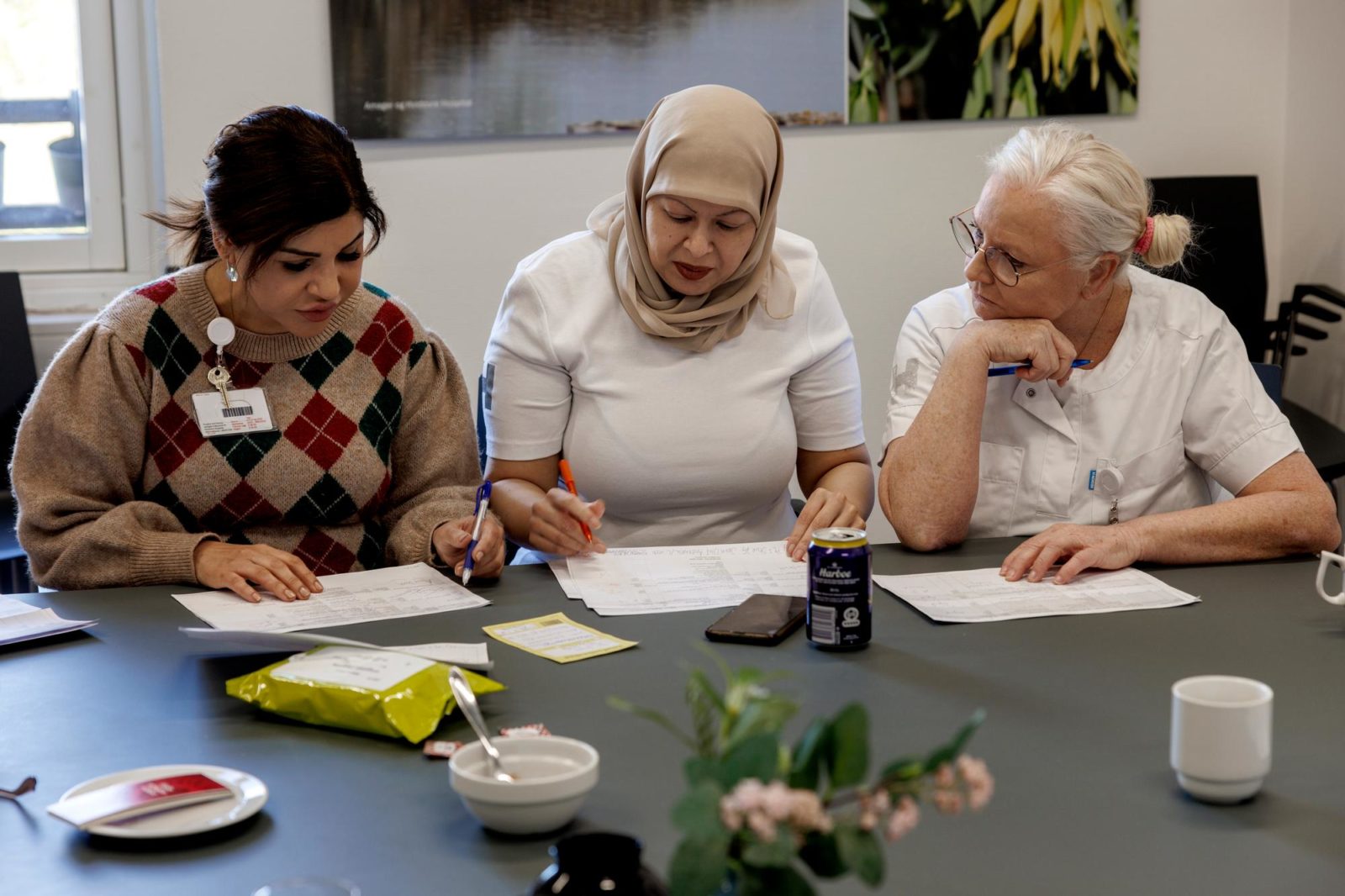
Photograph: Jacob Ehrbahn
In a deep crisis
Every morning in The Palliative Care Unit starts with a meeting in the staff room at the end of the hallway. This Monday in April is no exception, with doctors, nurses, the unit’s psychologist, and social worker gathered around a table talking over the patients. A middle-aged man is in such severe pain that he can barely be touched; another needs to be discharged to a hospice; a third patient requires a Polish-speaking interpreter; and then there’s a male patient who is in a very bad psychological state. He feels lonely, hasn’t slept all night, and wants to hold hands all the time, says nurse Sigrid Nielsen.
»He is really in a deep crisis«.
The man is not psychotic or suicidal, but he needs someone who listens.
»We can’t change his life circumstances, but I’ve told him, ‘You need to stay here until you feel safe’«, says Sigrid.
The psychologist has made an appointment with him, and he has also been offered to talk to a priest.
After half an hour, everyone gets up. An alarm flashes above the door, nurses are needed in several rooms, and doctors are preparing for rounds. Some of them are going on home visits with the Unit’s palliative mobile care team.
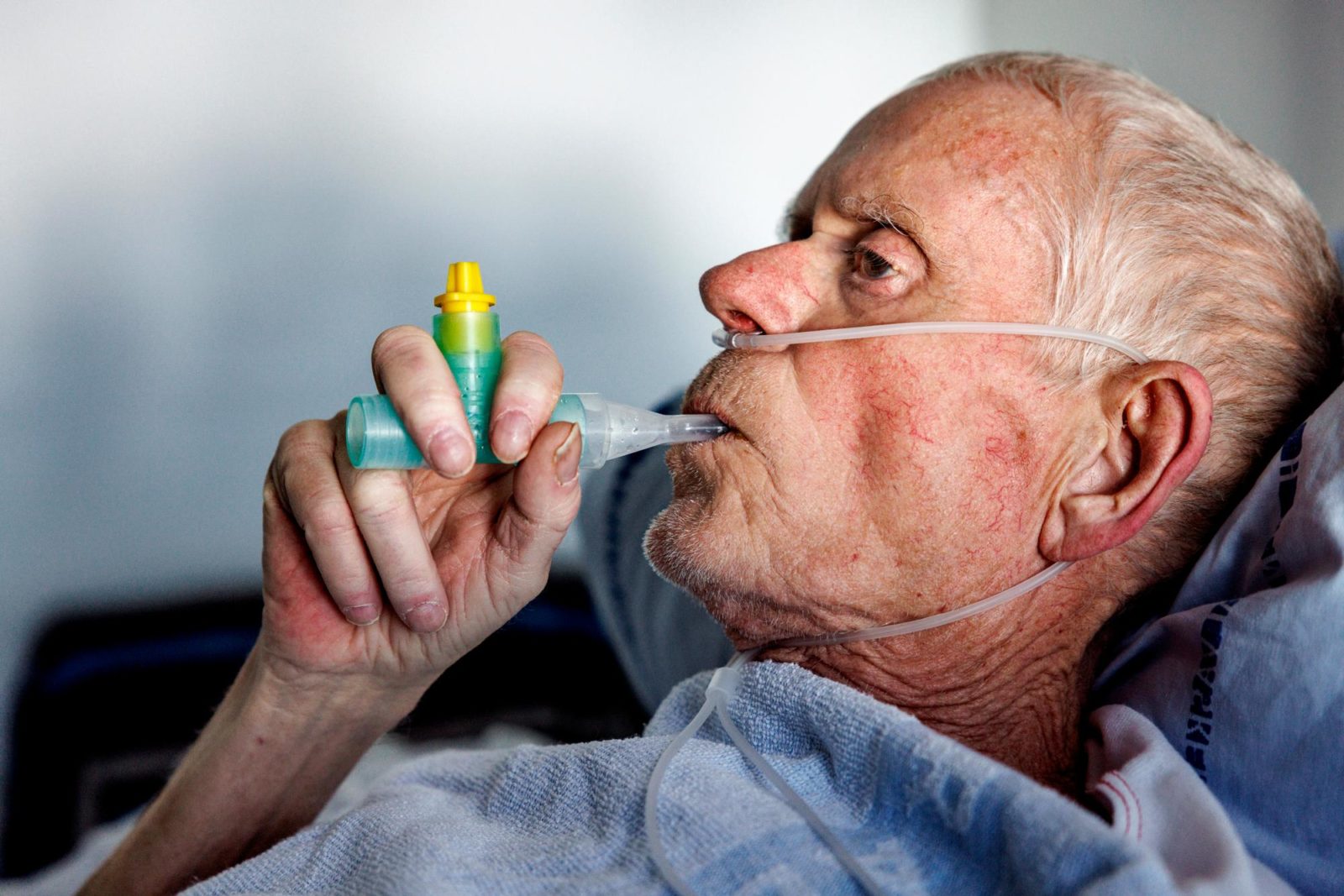
Photograph: Jacob Ehrbahn
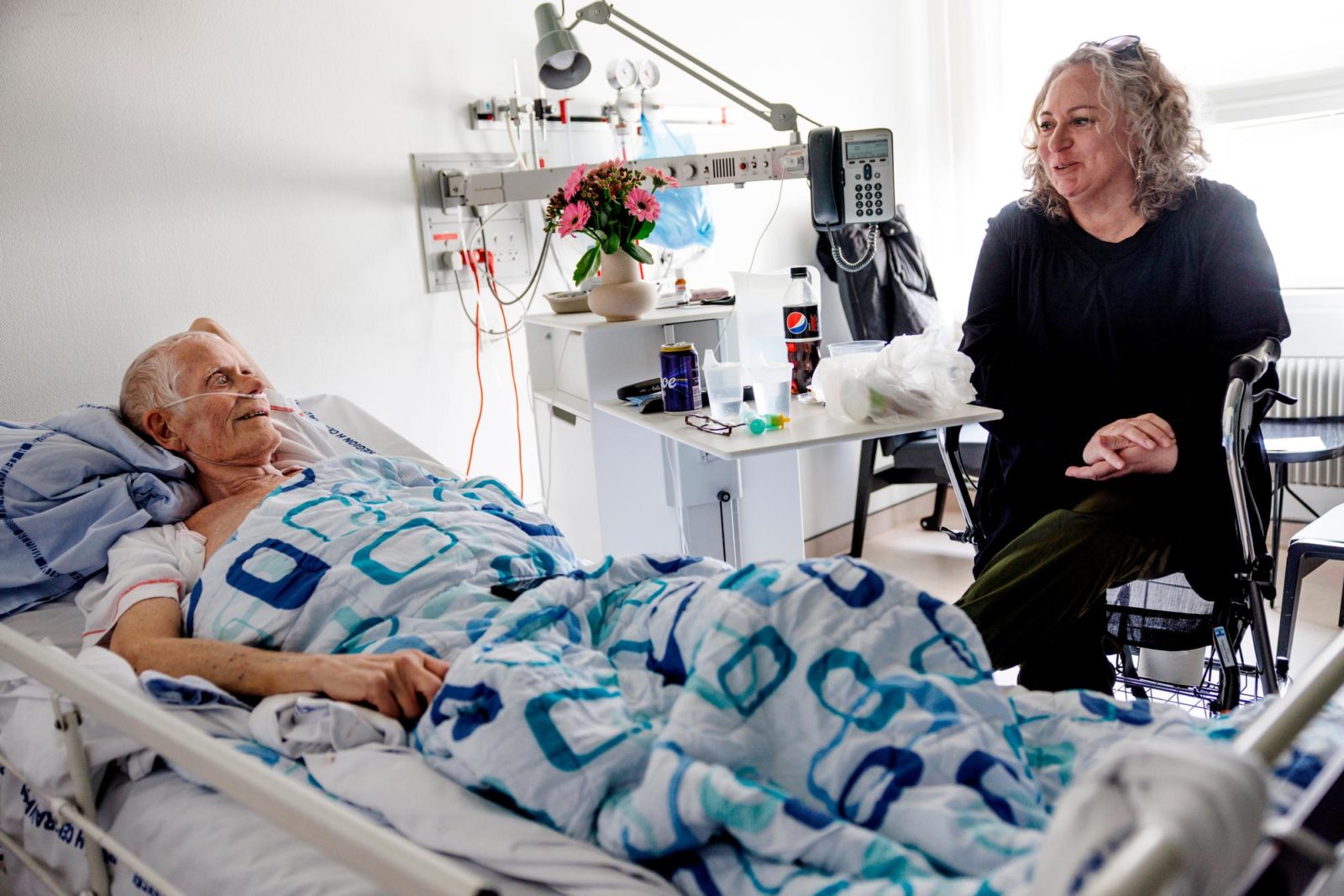
Photograph: Jacob Ehrbahn
Pain like fire
A small sign outside each room has a handwritten message, name, and a drawing. ‘Welcome René’ it says outside Room 14, next to a drawing of a tree. 67-year-old René Damgaard was admitted Monday morning. He came from the hospital’s pulmonary unit, where he had been lying for almost a month.
René’s eyes look large in his hollow face, and his hair is a bit disheveled. His bones are prominent at his shoulders and wrists, and his muscles have shrunk.
He started having back pain before Christmas, and the doctor thought it might be a herniated disc. He also got tired and felt colder than usual. He was sent to a physiotherapist, who couldn’t help him, and one day in late March, an ambulance brought him urgently to the hospital with severe pain. The paramedics thought it was intestinal obstruction.
»But then they found cancer everywhere«, says René. The disease had started in his lungs but had spread to his liver and bones.
Sigrid Nielsen enters the room and reminds him to drink more. He promises.
»As long as it’s just water or an energy drink«, says René.
He doesn’t drink alcohol anymore. He quit in 1996, he tells Dr. Johan Randén, who has just sat down next to him on the bed.
»Well done«, says Johan.
The doctor asks how they can help René. He’s short of breath, lacks appetite, he says, and then there’s the pain. It sits under his shoulder blade.
»A burning sensation«, says René, adding that otherwise he’s doing fairly well.
»I know what’s going to happen«, says René.
»What’s going to happen?« asks Johan.
»My life is coming to an end«, says René.
»What do you think about that?« asks Johan.
»It’s too early, but it is not up to me to decide«, says René.
He was offered chemotherapy but declined. He doesn’t know if he has a week or a month left to live.
»And chemo makes you really sick. I’d rather spend my time feeling good«.
Johan understands, he says.
»That’s not how you should spend your energy«.
»No, now it’s all about eating ice cream and popcorn whenever I want«.
The doctor explains that it’s important to speak up as soon as he feels the pain.
»Pain is like fire«, says Johan. »You can easily blow out a candle. But if the fire spreads and the whole kitchen is on fire, it’s hard to extinguish. It takes time for the medicine to work, so you need to tell us, as soon as you feel the first flame«.
René nods.
»I’ve never been good at demanding help«, says René.
As soon as the pain is under control, he wants to move back to his apartment in Glostrup, where he lives alone. His niece has rearranged his apartment, and everything is ready for him to spend his final days there.
»Do you have any children?«, asks Johan.
»I have a son«, answers René.
»Do you have a good relationship with him?«
»No«.
»Does he know you’re sick?«,
»No«.
Out in the hallway, Johan Randén stops and talks with Sigrid Nielsen.
»Maybe we should ask René if he wants to write a letter to his son«, suggests Johan.
Preparing for death
Not all patients are at peace with death as is René Damgaard. Even though most of the unit’s patients are dying, they don’t always realize when they’re admitted. And sometimes not even then.
»We don’t tell our patients it’s the end of the line. But when they come to us, it is their last lifetime«, says Sigrid Nielsen.
Some can live for a long time after coming here.
»But only few of them are that lucky, and we need to help them handle it«, she says.
Johan Randén says one of his most important tasks is to listen to the patients.
»You can run all kinds of blood tests and scans, but if you don’t talk to the patients about what they want, it’s pointless. You must talk to them. And touch them«, says Johan Randén.
Johan Randén and his colleagues in the palliative care unit often experience that no one else in the healthcare system has talked to the patients about the fact that the treatment could extend life, yet diminish its quality, especially towards the end. The lack of courage and time to initiate that conversation means that the people dying end up missing out on quality time with their loved ones.
»Many doctors shy away from talking about death. They keep treating the patients until the very last moment before they finally say: ‘Now there is nothing more we can do.’ But then there is no time left for the patient to prepare themselves for death«, says Johan.
There are three things that are important for someone dying to get the opportunity to say to the right people, Johan Randén says:
»Forgive me. I forgive you. And I love you«.
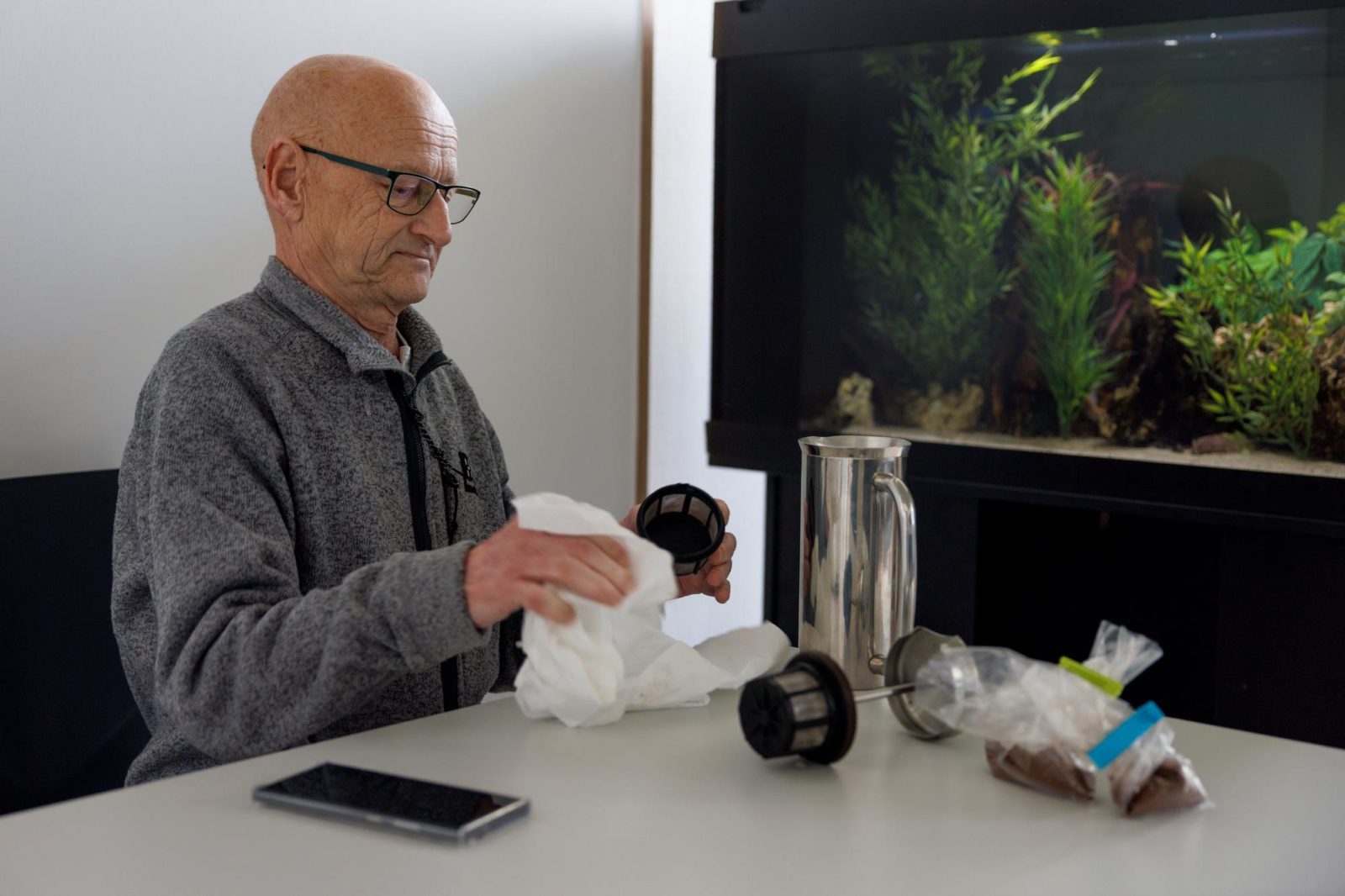
Photograph: Jacob Ehrbahn
Someone who listens
»Life is too short for bad coffee«, says Niels Abrahamsen, 63 years old. He pours freshly ground coffee into a glass pot from a small bag his wife, Rikke Abrahamsen, has brought. He smells the freshly ground beans and says, »Ahhh«. On his bedside table is a box of filled luxury chocolates. According to Niels, life is also too short for bad chocolate.
Niels often uses that phrase. He is a bon vivant. But it is also literally true for him. He was diagnosed with stomach cancer in January 2020, but even with a death sentence hanging over him for four years, he has not lost hope, he says.
In February, however, he had a stomach bleeding, and after radiation therapy to stop it, he experienced severe pain. In recent weeks, there has been a buildup of fluid in his abdomen, and a few days ago, he was admitted to the Palliative Care Unit to relief his discomfort.
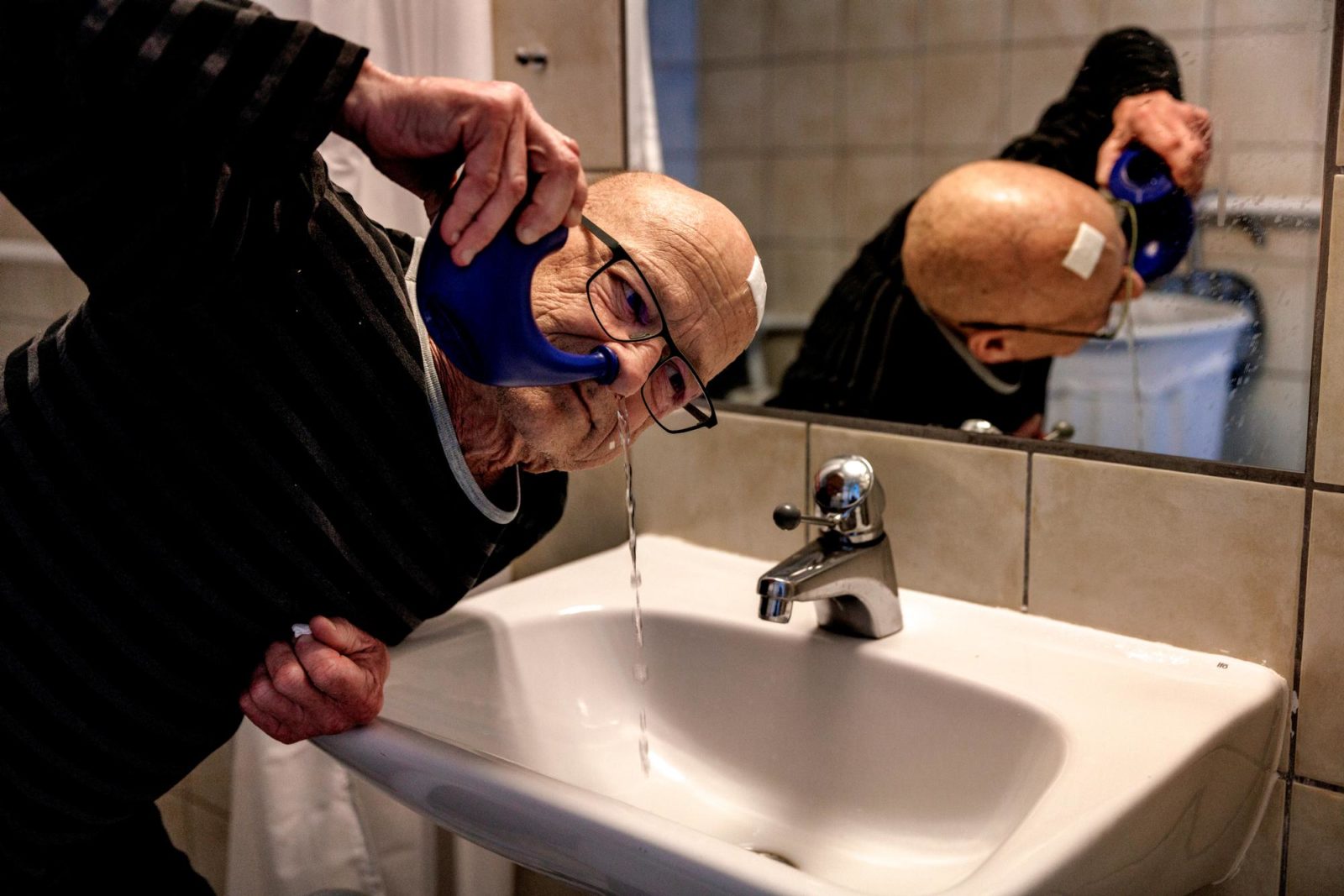
Photograph: Jacob Ehrbahn
Niels Abrahamsen’s approach to illness is holistic, he explains. On his bedside table are various “exquisite” dietary supplements – as he puts it.
He does not like medication – especially not chemotherapy, of which he has had around 30 treatments.
»I’ve stopped counting«.
Niels is a trained physiotherapist and well-read in nutrition, body, and mind.
»I’m always two steps ahead of the doctors«.
He likes the palliative unit compared to the gastro unit in the hospital where he was initially admitted, and where everything was »complete chaos«
»They are more professional here, more experienced, and they have time to sit down and hold your hand«, he says.
He has settled in to his room with a yoga mat, a nasal pot, and a stack of special magazines. He also unpacks a bluetooth speaker his wife has brought around so he can listen to good music. Because life is also too short for bad sound, says Niels.
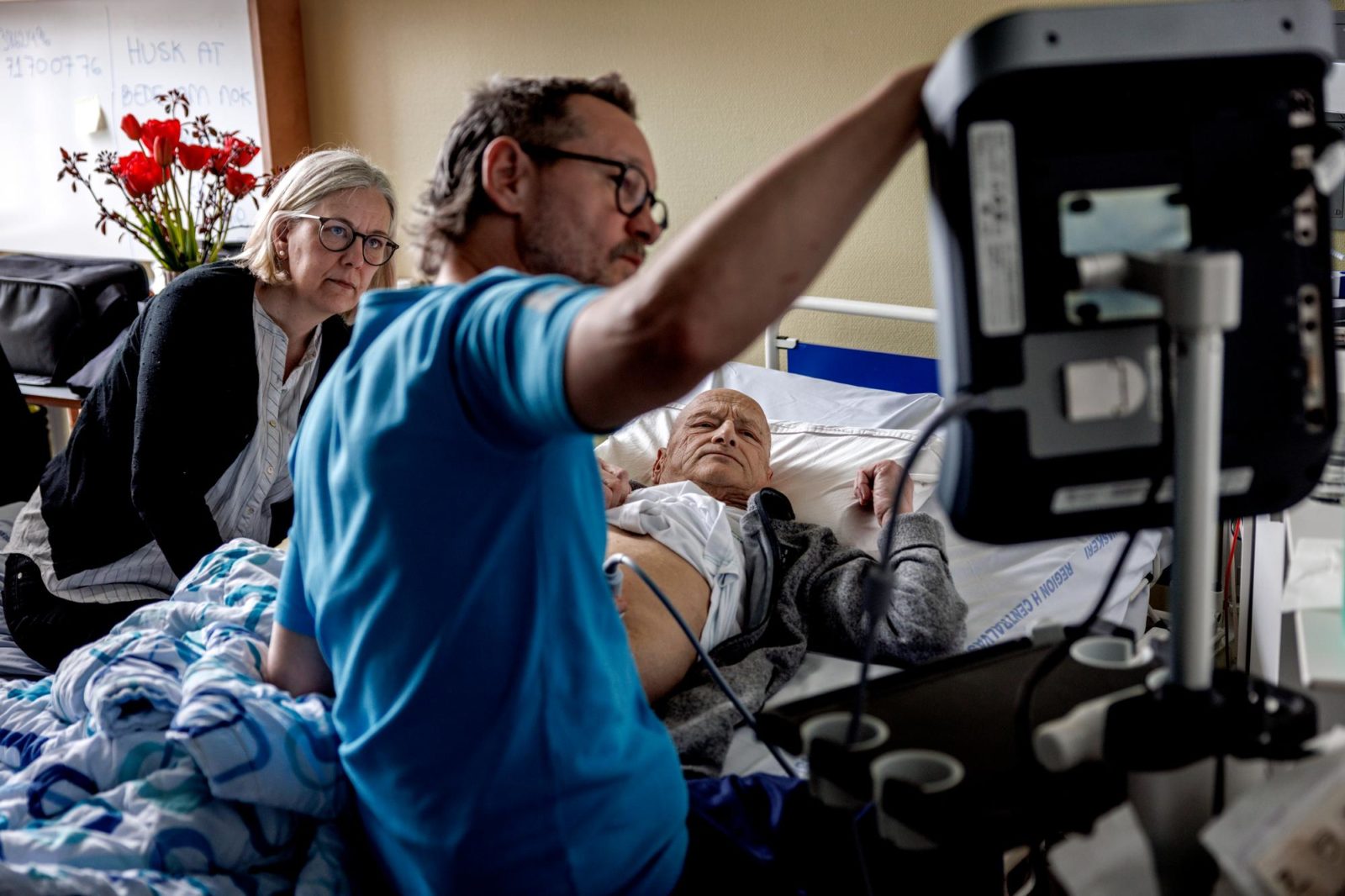
Photograph: Jacob Ehrbahn
Doctor Johan Randén enters to check on Niels. His abdomen is swollen with fluid, and during the night he paces the hallway restlessly because he can’t find and rest. Johan wheels in an ultrasound machine, sits on the edge of the bed, scans, and gently feels Niels’ stomach.
»I know my body quite well«, says Niels and tells Johan about a range of breathing techniques.
They discuss whether to try to drain some of the fluid or wait a while.
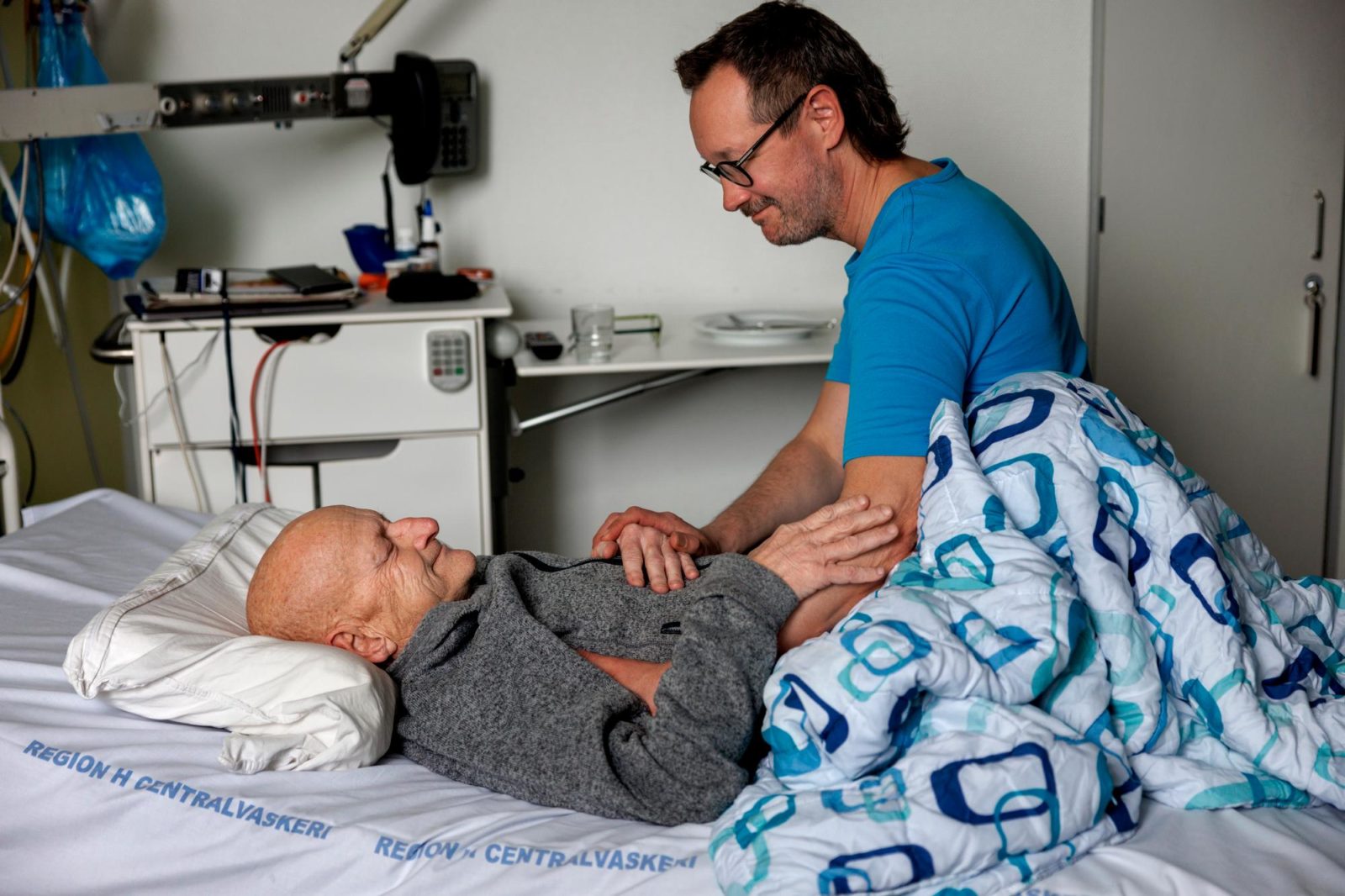
Photograph: Jacob Ehrbahn
»We’ll take it step by step and see what we can do for you,” says Johan when he has turned off the machine. He sits for a moment, quietly, patting Niels’ hand. Suddenly, Niels begins to cry.
“You are moved. What’s happening?” Johan asks.
“It’s you, Johan. You are the most attentive doctor I have ever met,” says Niels.
He covers his face with his hands as tears stream down.
“It’s not easy, I know” says Johan.
After the doctor leaves, Rikke leans over the bed and kisses Niels.
“When another person listens, it gives security and hope,” says Niels and continues.
“But now I need something to eat and drink.”
He empties the contents of a food box Rikke has brought to him onto a plate: eggs, bacon, and a slice of bread.
“I don’t eat much, but what I do eat has to be of good quality. And I don’t use sea salt because of microplastics,” says Niels as he sprinkles his food with rock salt stored in a small orange tin.
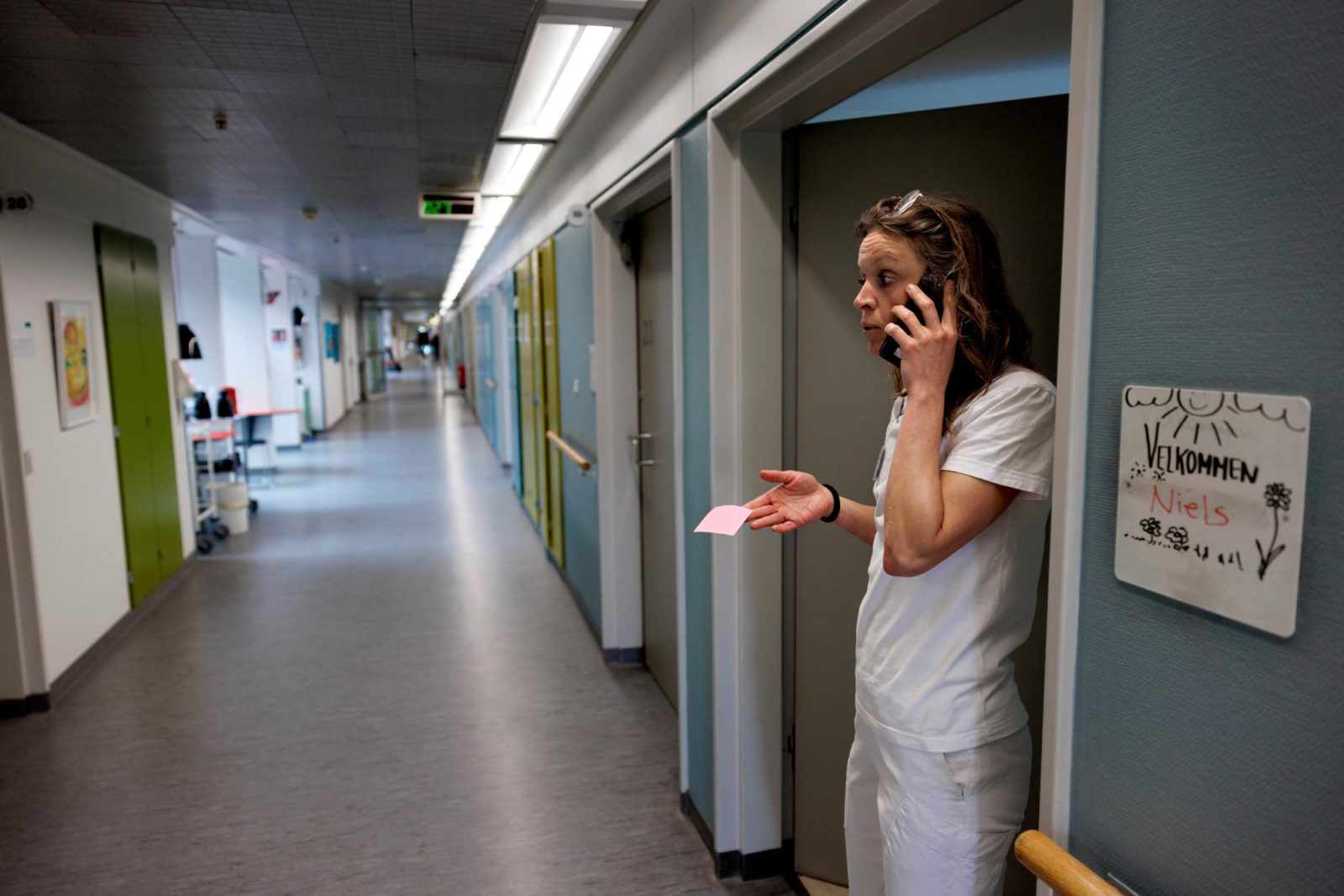
Photograph: Jacob Ehrbahn
Cakes from relatives
The nurses move quickly down the corridors, keeping an eye on both the clock and flashing alarms. However, when they enter the patients’ rooms, the pace is often different. They speak softly and take their time. Both patients and relatives talk about a unique calm atmosphere in the unit – a stark contrast to the hospital’s other departments, where most patients have been admitted during their illness.
One afternoon, a middle-aged man enters the corridor. In his hands, he holds two large boxes with cream puffs, which he places in the nurses’ office. His wife died in the unit a month ago. They were admitted together up until her death.
»We had talked about her coming home to die, but she felt most secure here«, he says.
Now he wants to say thank you.
»I promised my wife that I would come back and properly say goodbye to the staff«.
But it was difficult to walk through the door to the unit.
»This is where I saw my wife for the last time«, he says.
The man gets a cup of coffee and talks at length with two of the nurses. One of them places a hand on his shoulder. His eyes filling with tears.
»We don’t just take care of the patients; we also take care of the relatives, their emotions, and their grief«, says Sigrid afterward.
In a plastic basket she has saved some of the many thank-you cards and letters she has received over the years. There are also several memorial folders from patients’ funerals she has attended.
»You don’t just distribute food, make the beds, and give medication. You also embrace them and care for them«, she says.
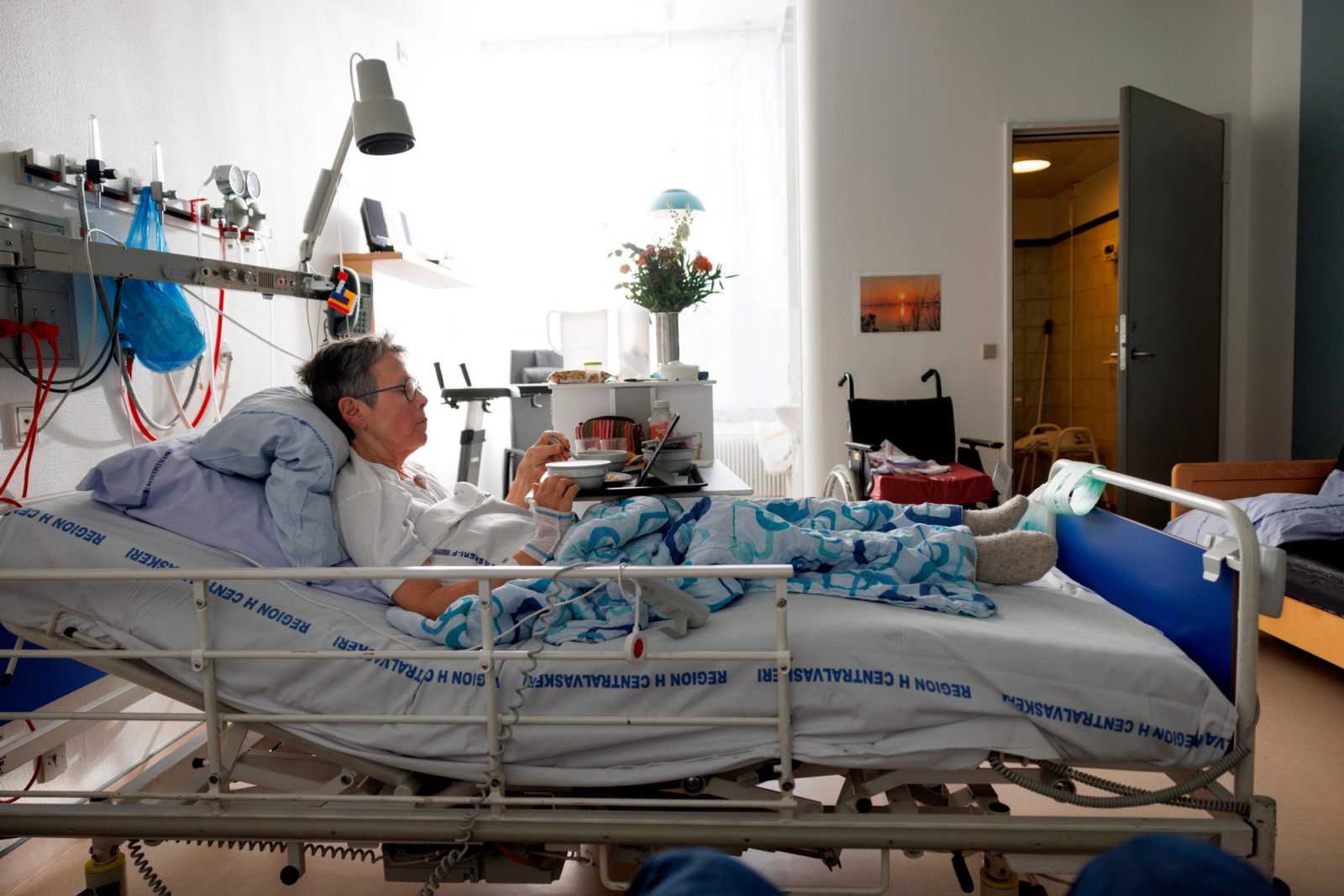
Photograph: Jacob Ehrbahn
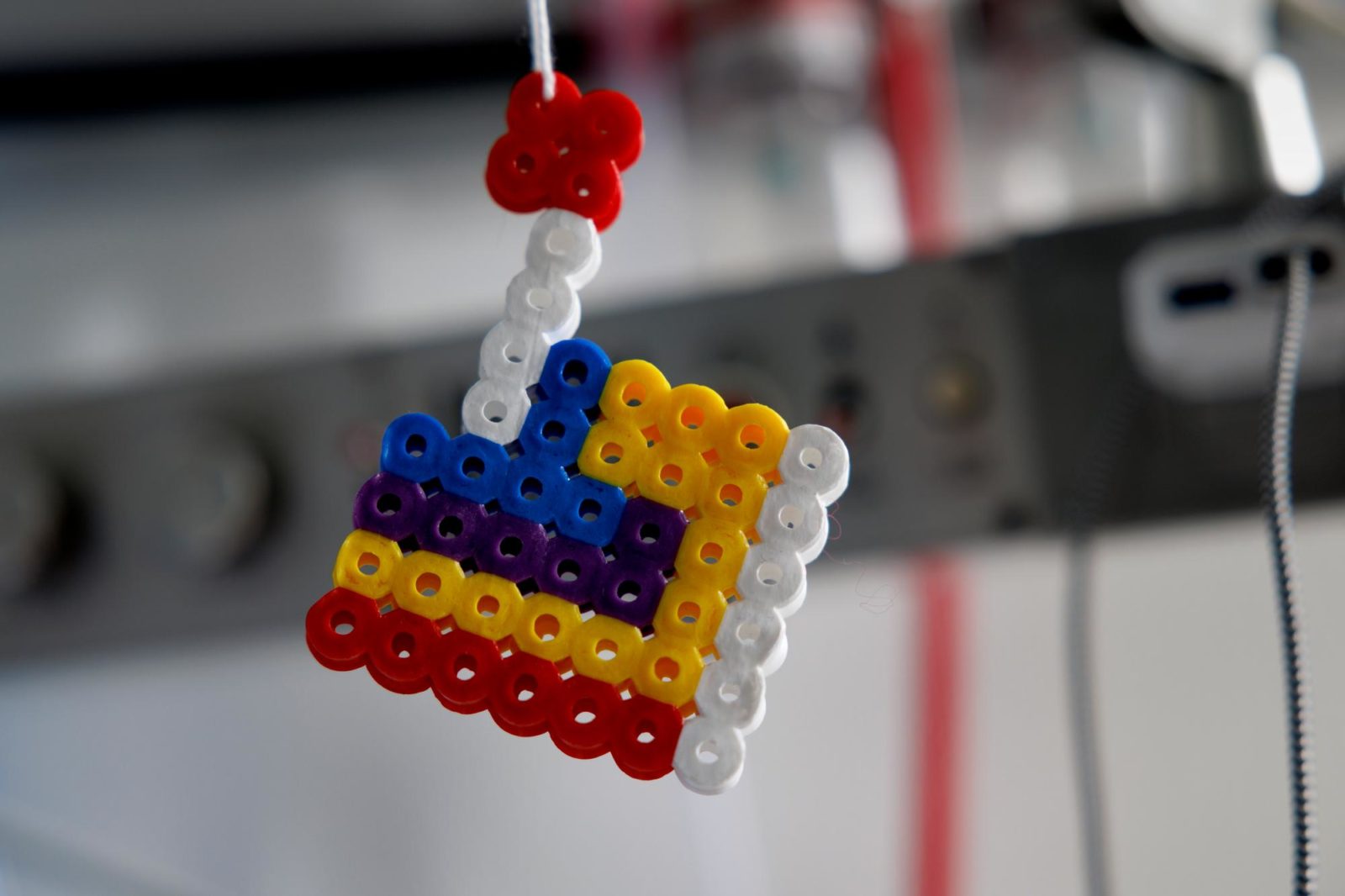
Photograph: Jacob Ehrbahn
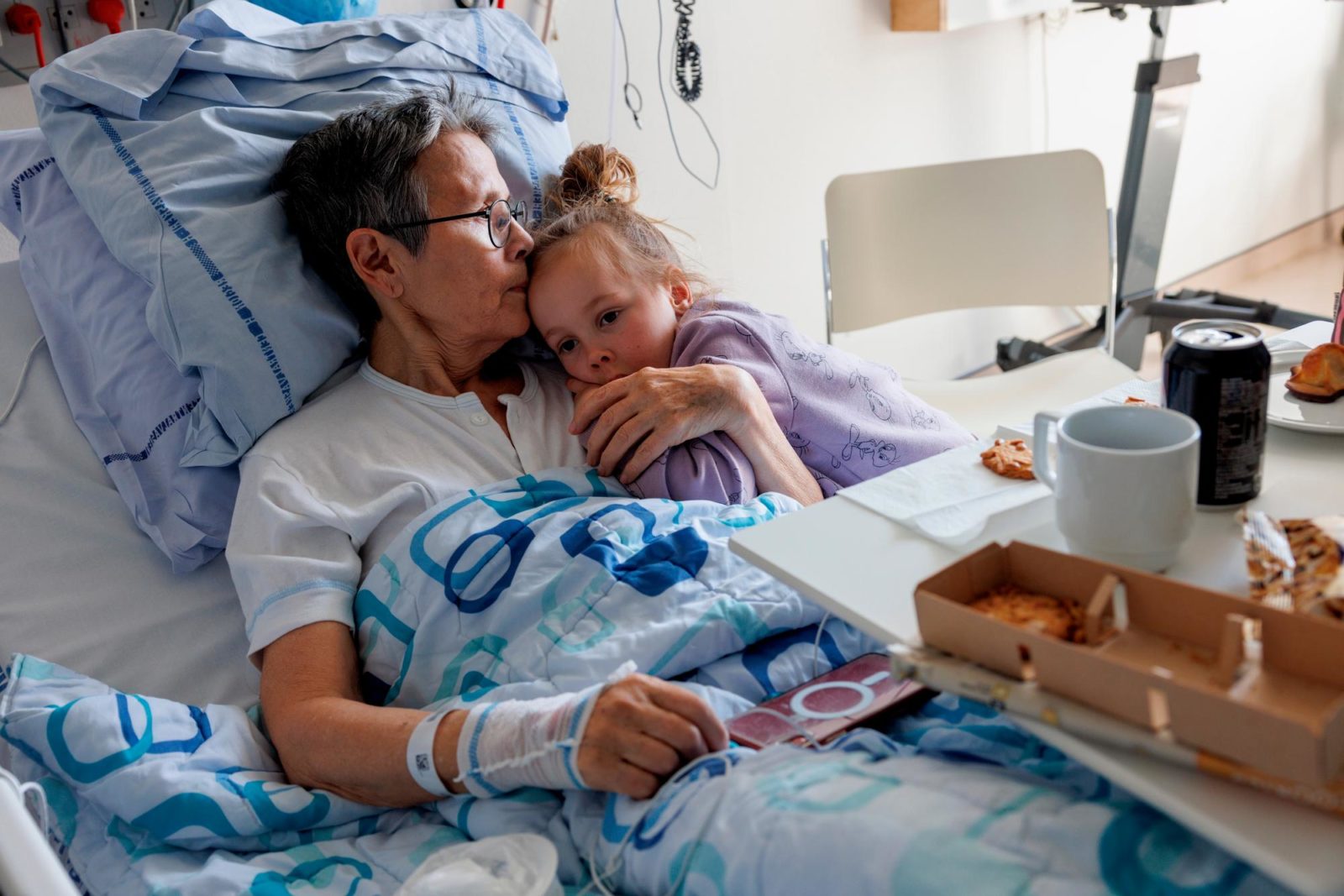
Photograph: Jacob Ehrbahn
Married Couple Admitted Together
In room 11, Liv Simonsen is being paid a visit by one of her three daughters and two grandchildren. The youngest crawls into her bed and cuddles up to her. The girl doesn’t say much but shows with her hand how old she is. Five fingers. On the wall of the room hangs a child’s drawing of a princess in a castle.
Liv is 70 years old and had just retired from her job as a speech therapist when she was diagnosed with breast cancer in 2020. She was declared cancer-free in 2021. But in January, she experienced back pain.
»The doctor thought it was muscle pain and just wanted to give me pills«, says Liv.
But when she was urgently admitted to hospital with severe pains, they sent her for further examination. It turned out that the cancer was back and had spread to her spinal cord and bones. Now it is incurable. When Liv was admitted to the Palliative Unit last week, the pain was so intense that she couldn’t get out of bed. She has never been able to sit still. Three months ago, she was swimming, playing volleyball, and padel.
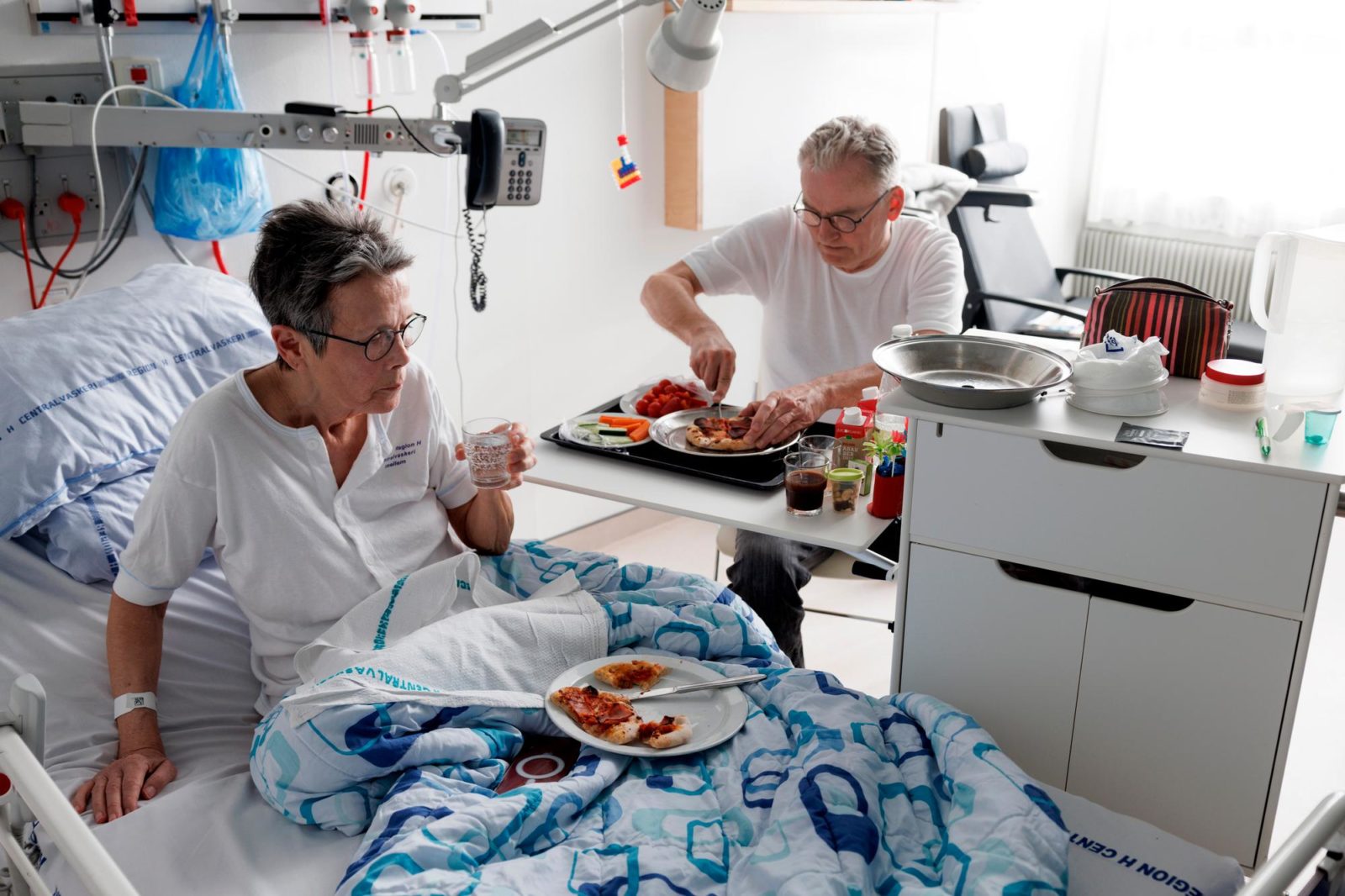
Photograph: Jacob Ehrbahn
»And now here I am«, Liv states quietly. She lives in a townhouse in Albertslund with her husband Jens. Together they have five children and ten grandchildren. He is also admitted in the room – his bed is placed close to hers.
The oncologists’ plan is to keep the disease at bay with oral chemotherapy. But only if Liv recovers strength enough to move around. Otherwise, they will have to stick to life-prolonging treatment, she explains. And first, the pain must be under control.
A nurse brings a small brown pill that Liv needs to take to muster the strength for later when her sister comes to visit. Doctor Johan has prescribed the morphine-based drug Oxycodon. Initially, Liv didn’t want to hear about it.
»I freaked out when he mentioned it because I’ve heard on TV how people can become addicted to opioids«
Johan explained to her that it was for the pain. Not for fun.
»And now I’m glad. It’s really nice not to be in so much pain«.
But when the pain is under control, you start to think.
»And then you get sad. I told Sigrid earlier that if I start crying, it feels as if I can’t stop«, she says and adds, »But when my grandchildren are here, I don’t cry«.
Soda popsicle in bed
Johan looks at the CT scan pictures of René Damgaard on a computer. It looks like a map – his bones, lungs, and other internal organs depicted like islands in a sea of white and gray. Johan Randén scrolls, zooms in, and points to numerous small and large black spots and shadows. Cancer.
»There, there, and there. It’s everywhere and it’s causing him pain«, Johan explains.
Even though they can’t cure or treat the cancer, there is plenty they can do to relief him, he says.
In room 14, René has dozed off with a Cross & Quiz magazine in front of him on the duvet.
»It’s the same with books. It takes too much effort to hold them up with these arms«, he says, waving his thin, bony hands.
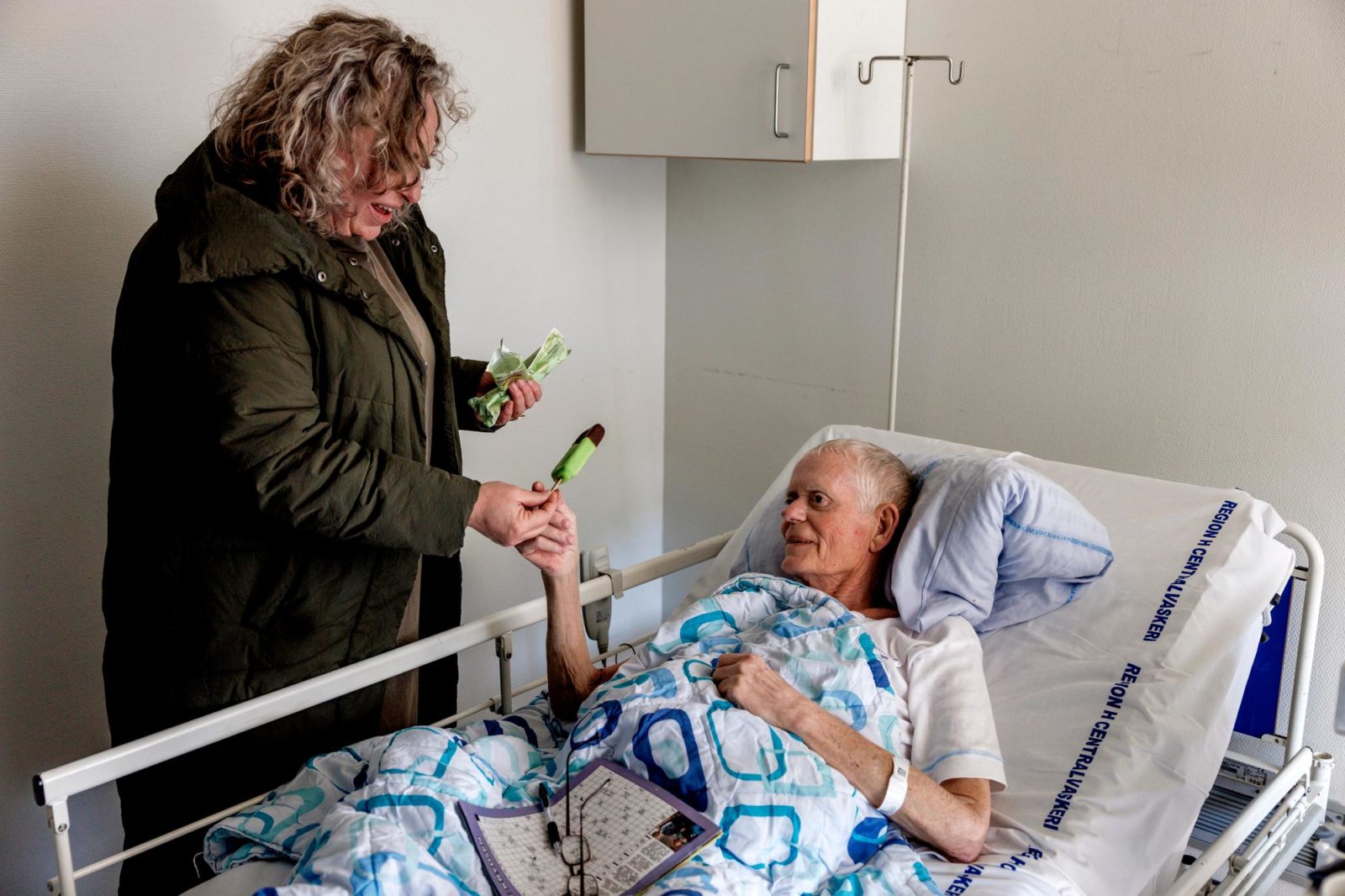
Photograph: Jacob Ehrbahn
His niece, Mette Damgaard, drops by straight from her job as a department head at a school nearby. She has brought a soda popsicle for him called ‘Champagne’.
“This is the only type of champagne we use to celebrate«, she says. They both laugh. She has big, curly hair and smiles a lot. She is the daughter of René’s older brother, and there are only 14 years between uncle and niece.
»I changed her diapers when she was a little girl«, says René between bites of his ice pop.
Her father died of cancer.
»When René is no longer here, there won’t be anyone around anymore who has known me my entire life«, says Mette.
René has worked in shipping, as a hospital porter, and in IT. While he has been in the hospital, he turned 67 and is now officially retired. He was supposed to spend all his time now on his hobby, fishing.
Instead, he is scheduled to be discharged on Monday to die at home, and Mette has applied for care leave so she can be with him as much as possible.
»You can sit by the window and see the new leafs on the beech hedge, and we’ll eat good food. I’ve stocked up on frozen meals«, she says.
She has arranged home care from the municipality up to 12 times a day. Still, she worries about her uncle being in pain. When she talks about it, tears well up in her eyes. René sees this and says:
»It’s hard for you too, Mette«.
»When you’re in pain, it breaks my heart«, she says.
»I’ll make sure the discharge goes well«, promises nurse Sigrid. »But you need to tell us when you’re in pain«,she says, looking a bit sternly at him.
It’s difficult, René admits.
»I don’t like to complain«, he says.
»We’ve talked about this. You’re a fighter. You always have been«, says Mette.
When Sigrid gets up to leave, she gives René’s feet a kind squeeze.
For the doctors and nurses in the unit, it’s important to prepare both the family and the patients for death, so it doesn’t end in helplessness and chaos. But it’s not always possible, says Johan Randén. The patients hardest to handle are those who don’t want to talk about death and do everything they can to avoid facing it.
»Especially young people, and mothers with small children. They fight with everything they have, understandably«, says Johan.
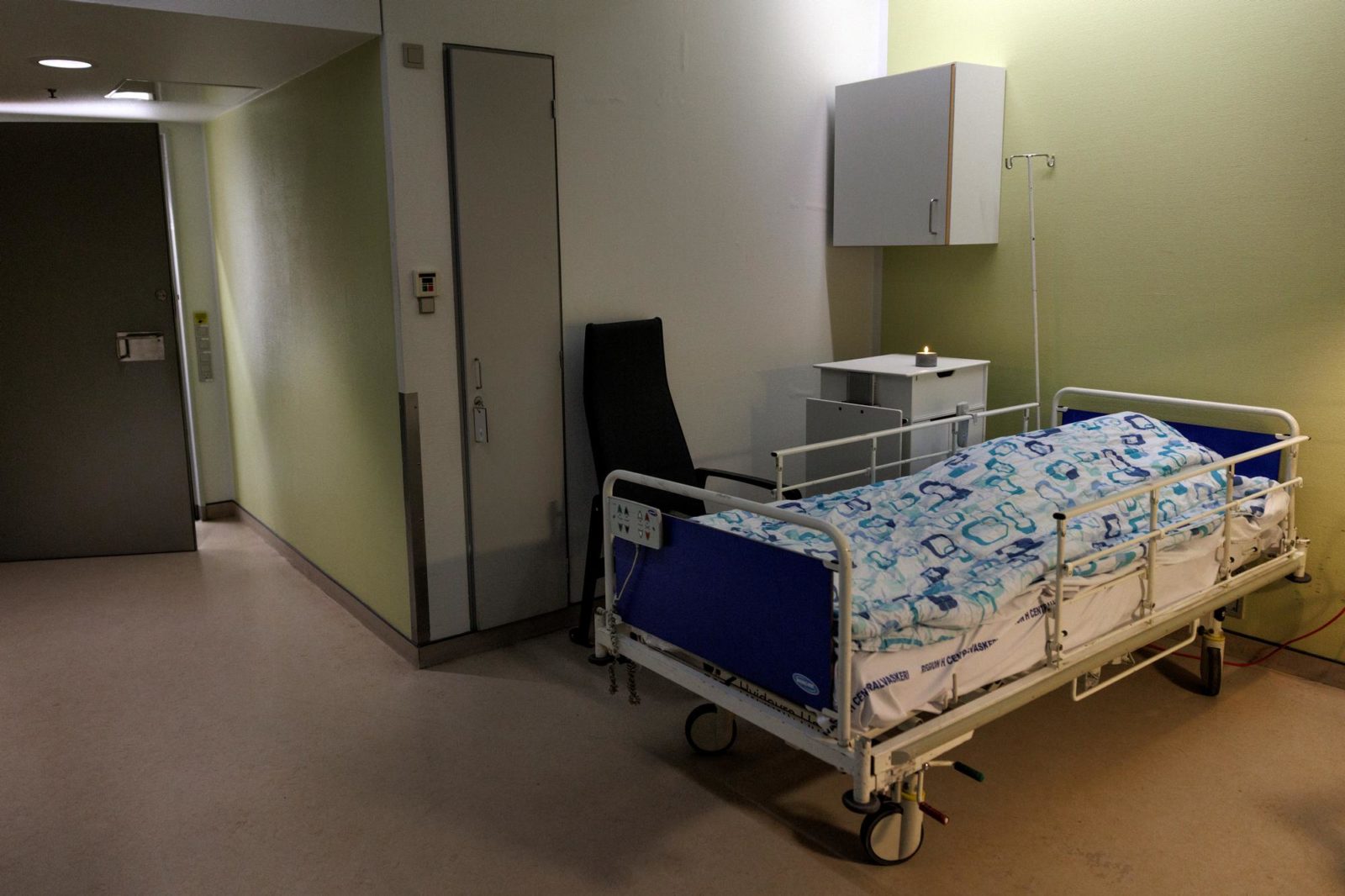
Photograph: Jacob Ehrbahn
Even though most dying people want to be at home, both patients and relatives can become uncertain or overwhelmed in the final days and hours. And then the dying person gets admitted to hospital, stabilized, and perhaps sent home again, only to end up in the hospital again a few days later.
»Sometimes it ends up in what I call ’emergency-light deaths,’ where a patient is rushed in by ambulance, dies on the way, is resuscitated, and maybe doesn’t regain consciousness and never gets a chance to say goodbye. That’s not a dignified death«, says Johan.
A 60-year-old man is admitted to room 23 from another ward in the hospital. But just a few hours after his bed is wheeled through the door, he passes away. He had terminal cancer for many months and was admitted to the Palliative Care Unit several times. His plan was to die at home, but his family felt uncomfortable with the situation, so he was admitted and discharged multiple times.
The nurse who was with the family when the man died recounts how he kept fighting, even though a few days earlier he had told his family he was ready to go. She felt powerless and wished she could have done more for both the patient and the family. But there wasn’t enough time. Afterwards, she takes a moment to collect herself in the nurses’ office. Tears well up in her eyes. A doctor places a comforting hand on her knee and reassures her that she did her best.
She finds brochures for the relatives titled “When Someone Dies.” The man died just as her shift ended, and although the nurse is technically off duty, she stays to help prepare the deceased.
The people who choose to work with the dying are often a special type, says the head nurse of the unit, Trine Andersen.
»They are in touch with things that not everyone is in touch with. The existential. And to be allowed into that space with the patients, you need to have a broad filter«, she says, adding, »We don’t see it as a sign of weakness here if someone gets emotional«.
Chasing the good days
During the night just before the weekend, René Damgaard gets a fever. He wakes up with chattering teeth. The next morning his skin is still sweaty. Johan Randén examines him immediately, even before the morning meeting.
»I think you have pneumonia. So, take it easy – no dancing today«, the doctor says, prescribing antibiotics.
»We need to get you back on your feet. You still want to go home on Monday, right?«.
René struggles through a handful of pills with the help of a protein drink. Sigrid Nielsen arrives.
»I’ll open the curtains so we can get some sunlight in. It’ll make the day a bit better«, she says.
She starts preparing everything for his discharge, so he will get all the help and care he needs for his final days. Wound care for his bedsores, a terminal declaration so all medication is free of charge. She also notes down the phone number for the emergency nurse, so René and his niece Mette have someone to call. But Sigrid doubts he will make it until Monday morning. Pneumonia is serious in his condition.
»He might die over the weekend«, she says, adding, »I’m just being realistic«.
The most important thing is that he is not in pain.
»We are chasing the good days«.
No sugar-coating
For Liv Simonsen in room 11, it’s a bad day after several good ones. She feels nauseous and sits up in bed with a small plastic pill cup of medicine in front of her and a smoothie beside her bed. She can’t get either of them down due to her upset stomach. It started last night.
»I threw up and got really tired. Like I was hit with a hammer«, she says.
Three small pills remain. Johan enters and sits down on the edge of the bed. He listens to her stomach with a stethoscope.
»Nausea can have many causes. Sometimes it’s an imbalance in the body. Sometimes it’s the medication. Sometimes it’s anxiety. It all feels the same«, he says.
Sigrid has joined them. She wants Liv to get out of bed.
»You need to get up and brush your teeth, and then we’ll get you in the wheelchair and wrapped up so you can sit on the terrace in the sunshine. It’s better for your appetite, and your mood«, says Sigrid.
She speaks firmly, leaving no doubt that this is how it will be.
Liv is grateful for the way she is treated. That Sigrid constantly reminds her to make the most of the time she has left.
»And she’s optimistic about what I can do. Not that they’re sugar-coating things here. They tell it like it is. But in a good way«.
Shortly after, Liv falls asleep. In front of her on the duvet, between her hands, lies a vomit bag.
Reborn After Exercise
Physiotherapist Niels Abrahamsen has had trouble sleeping. He usually stays active with physical exercises but hasn’t had the energy in recent days. He is increasingly worried that the fluid in his abdomen is due to cancer spreading. He has asked for a CT-scan.
»We’ll see where it leads. I plan to cheat the grim reaper again«, says Niels. »But this bloated stomach is a bit ‘complicato’«, he adds.
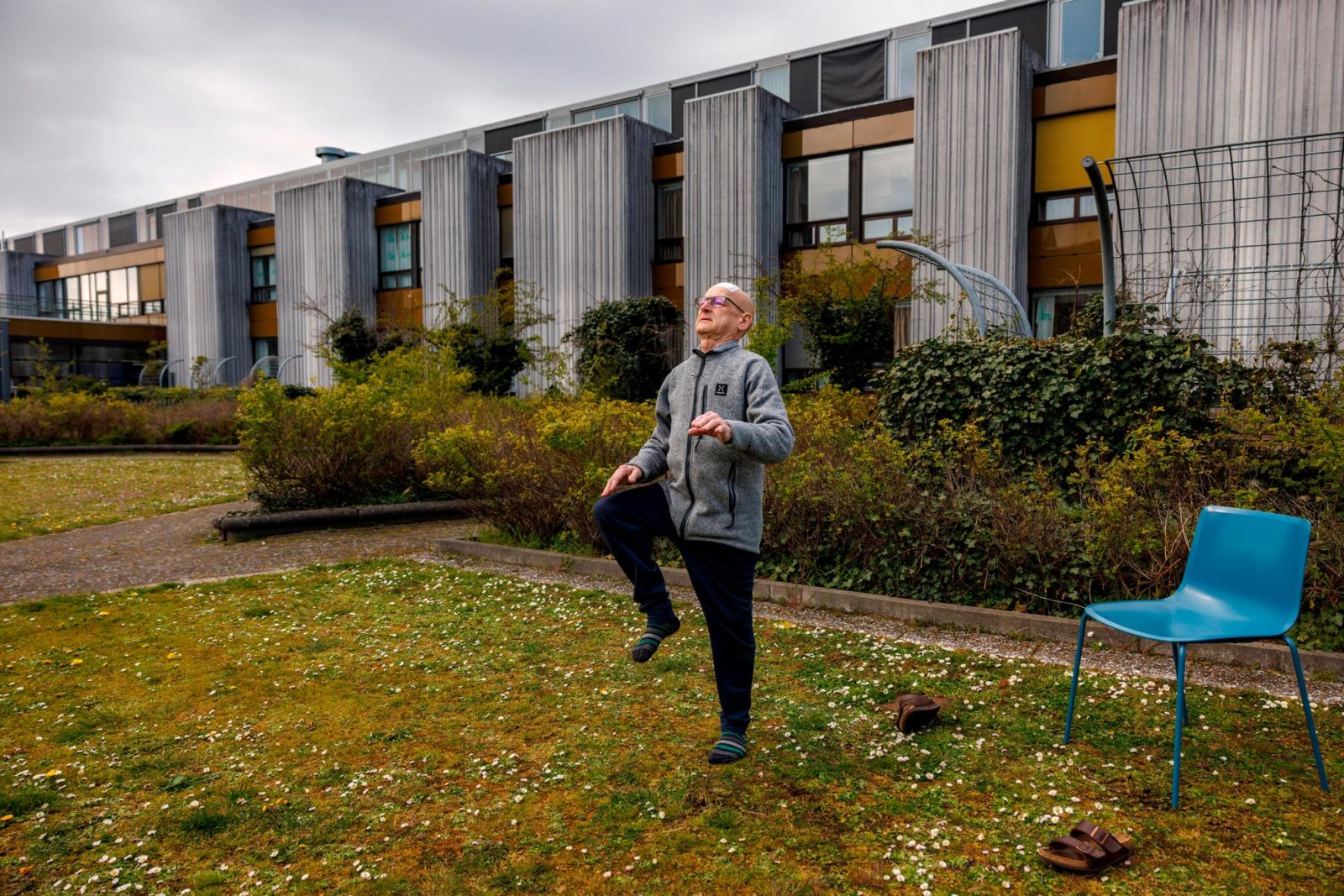
Photograph: Jacob Ehrbahn
He keeps up with music – both big stars and new names, and he has tickets for both a Bruce Springsteen concert in July and a local music festival in August. He also bought tickets for the Euro 2024 football games in Germany, which he hopes to attend with his 19-year-old son who graduates from high school in a couple of months.
»It’s going to be huge. I must be there«, he repeats, emphasizing the word »must«.
However, he knows he can’t travel in his current condition. He takes more morphine than he’d like.
»And then my stomach gets constipated, and I get sluggish and forgetful«, he says.
He takes a walk on the grass outside the hospital and performs a gymnastics routine in his socks among daisies and bushes. He does this every day year-round at home in his own garden, he says.
»Now I feel almost reborn«, he says afterwards.
Frightening shadows
René is scheduled to be discharged Monday morning. But that doesn’t happen. Over the weekend, he gets delirium – a condition with hallucinations that often affects the dying and very sick. He has seen visions of both his mother and father, and when Sigrid arrives, he is crying.
»Ouch, ouch, ouch«, he says. »I’m so confused«.
Sigrid doesn’t think he’s well enough to go home.
»What are you afraid of? Are you afraid to die?«.
The way she says it sounds like a mix between a question and a statement. René doesn’t respond.
»I will make the decision for you now. I can’t send you home when you’re in a state like this» she says.
René cries so hard the bed shakes and raises his hands to his face.
»Bullshit«, he finally says.
»It’s good for you to cry. It’s okay to let it out«, says Sigrid, stroking his short, gray hair. A little later, she gives him a shot of sedative and makes a call to cancel the transport home. She also gets hold of René’s niece, Mette.
René was supposed to get a visit from his son at home, whom he hasn’t seen in years. Mette arranged it. She promises to make sure the son pays a visit to his father at the unit instead.
Johan has just arrived. He hasn’t even taken off his backpack when he goes in to see René. He is still crying and upset about canceling the transport home.
»I’m causing so much trouble. Sorry«, he says.
»We’re used to it, and we have to do what’s best for you,” says Johan. “Don’t be so hard on yourself.”
Johan explains the hallucinations. Eighty percent of the dying patients experience them. It’s fells like dreaming while awake.
»It’s similar to lying on the beach and seeing a cloud in the sky that looks like an elephant. It’s not an elephant. But it looks like one«, explains Johan.
Sometimes the patients see people from their past. It can be frightening.
The room is quiet. Johan holds René’s hand and just sits there. For a long time. Eventually, René calms down. The medicine is working. Meanwhile, Sigrid walks down to the nurses’ office with the bag of medication René was supposed to take home.
»I had packed everything. But things never go as planned here«, she says.
She talks about a young female patient who was severely troubled by hallucinations before she died.
»It was very scary. She saw shadows that wanted to take her. They surrounded her in the room«,
Sigrid then moved her bed into the hallway and lay down with her, holding her.
»It was the only thing that helped. She was terrified«,
The last visitor
Every Monday, a musical duo visits the unit to play for the patients. It consists of a male guitarist and a female singer who knock on each room and ask if they may come in to sing a song. They are welcomed into three different rooms. They play ‘Somewhere Over the Rainbow’ to an 80-year-old woman, who has been in the ward for a few days. She appears to be asleep, and twenty minutes after the musicians leave, she takes her last breath.
Later that day, René’s niece, Mette, arrives. He feels better, after the decision has been taken about staying in the ward. He has eaten two cups of yogurt, and in a few hours, his 36-year-old son, whom he hasn’t seen in four years, will visit. They did not have an argument; the contact just faded.
It was the ward’s social worker who inquired about their relationship, approaching the topic cautiously, René recalls.
»And before I knew it, it seemed like a good idea«.
Now that the meeting is approaching, he is worried that his son might be angry with him.
»But he wouldn’t come if he was very mad, I guess«, René reflects. Although he has been sober since 1996, many things remain unsaid between them.
»And I know I was a jerk at some point«, he says.
»But a lot of good things have happened since«, Mette reminds him.
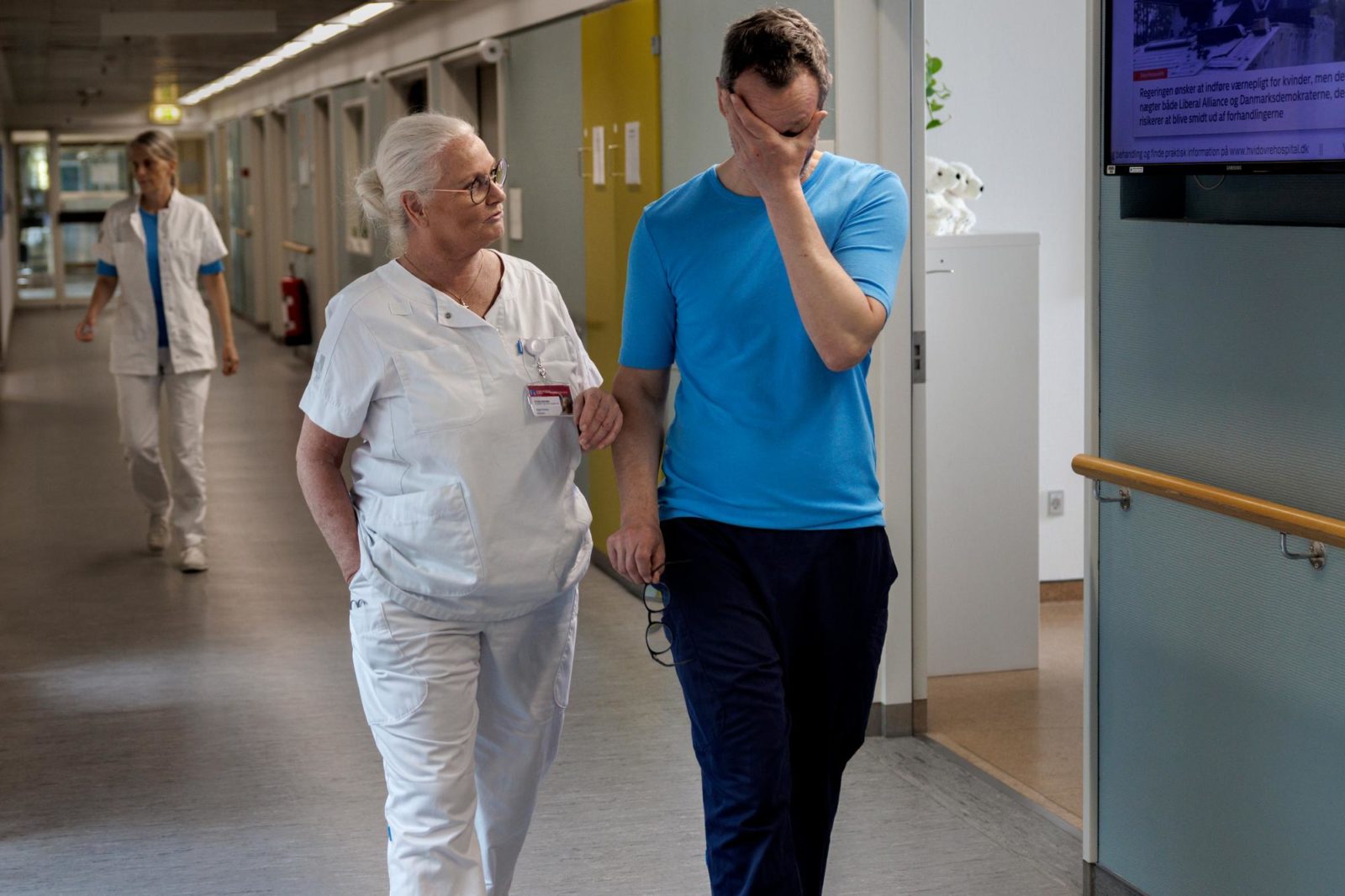
Photograph: Jacob Ehrbahn
René’s son arrives precisely at the agreed time. Johan and Sigrid greet him at his father’s bed. When they leave, Sigrid shows that she has goosebumps on her arm. Johan takes off his glasses and wipes away a tear. Sigrid and Johan hug.
»They get to say goodbye, and it’s good for the son and good for René. He can leave in peace with himself«, Johan says.
He often finds himself crying:
»I’ve seen many things that are both sad and beautiful. It works for me to take it in. It shouldn’t take over, of course. But sometimes, I need to wipe my eyes«.
René’s son stays for a long time. When darkness falls, he is still there.
Strong voice
Liv Simonsen in room 11 has felt better over the weekend. The pills are working, reducing her nausea. She has been out on the hospital’s roof terrace in a wheelchair several times. She has eaten Solero ice cream and had many visitors.
»When the pills work, I become weightless«, she says.
Johan and Sigrid want to persuade Liv to accept a temporary stay at a hospice facility, where she can regain more strength before possibly going home. They sit down in her room.
»Last week, we talked about apathy. You were very sad, but it seems like you’re in a different place now«, says Johan.
»Yes, it was a valley moment. But I feel better. I can talk about the future«, she says.
»You are no longer in pain, and it’s good to see that you are strong in your voice and gaze«, says Johan.
»There are good things amid all the darkness«, says Liv.
Her home is not set up to provide the necessary help yet, so she accepts the suggestion of receiving care at a hospice facility.
Johan walks towards his office to write the referral. As he makes his way down the hallway, he performs small, joyful dance steps.
The Worry Line in His Forehead
The next day, René’s condition has worsened. His hallucinations have intensified during the night, and now he is crying again, feeling frightened. After a conversation with Johan and Sigrid, he agrees to a combination of sedatives and painkillers that might cause him to fall asleep and not wake up.
»We talked to him about the possibility that he might not see Mette and his son again. But he was completely at peace. He wants to go to sleep now«, says Sigrid afterwards.
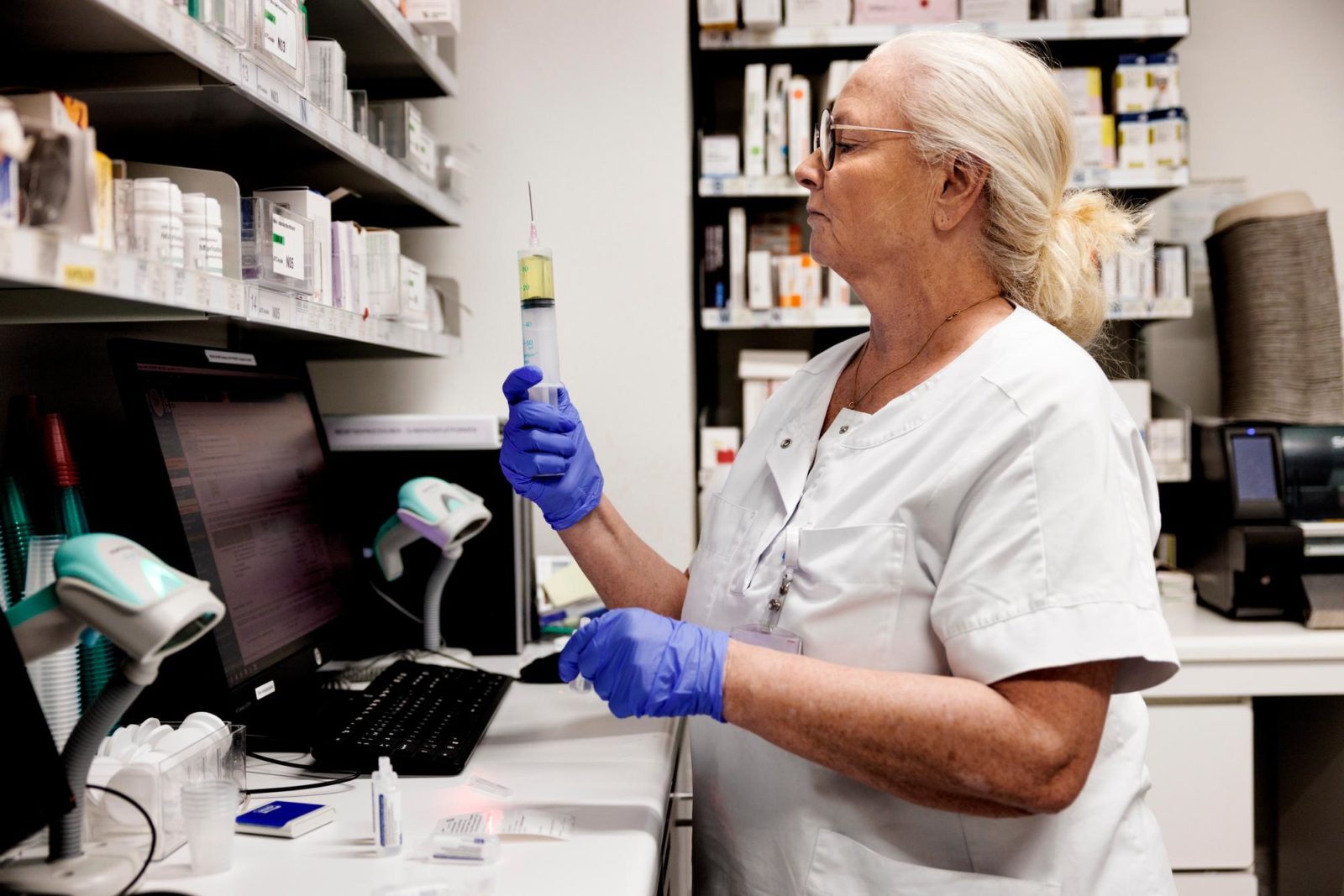
Photograph: Jacob Ehrbahn
This process is known as ‘palliative sedation,’ when terminally ill patients are given medication to relieve pain and reduce anxiety and distress, with the possible side effect of shortening life and causing loss of consciousness.
»He shouldn’t have to experience what he went through last night again. It’s too cruel«, says Sigrid as she prepares the mixture in the medication room. She sets up a pump by René’s bed that will provide him with a continuous dose around the clock. She inserts a drip into his upper arm just above a tattoo of the logo from Football Club København – the silhouette of a blue lion’s head. The once swelling muscle and the lion has shrunk.
René opens his eyes. She strokes his hair.
»Are you in pain?«.
He shakes his head and points to his mouth.
»But your lips are dry…«
Sigrid fetches small sticks with foam tips, which she dips in water and uses to moisten his lips and tongue.
He says something. It’s hard to hear. He repeats it in a barely audible whisper: »I’m sorry«
»No need to apologize. Now sleep«, she says.
He lies with his mouth open, head slightly tilted on the pillow, his breathing is shallow. Sigrid calls his niece and explains what is happening. On his way home, Johan passes by René’s room. Now René is breathing calmly.
»The frown line on his forehead is gone«, says Johan.
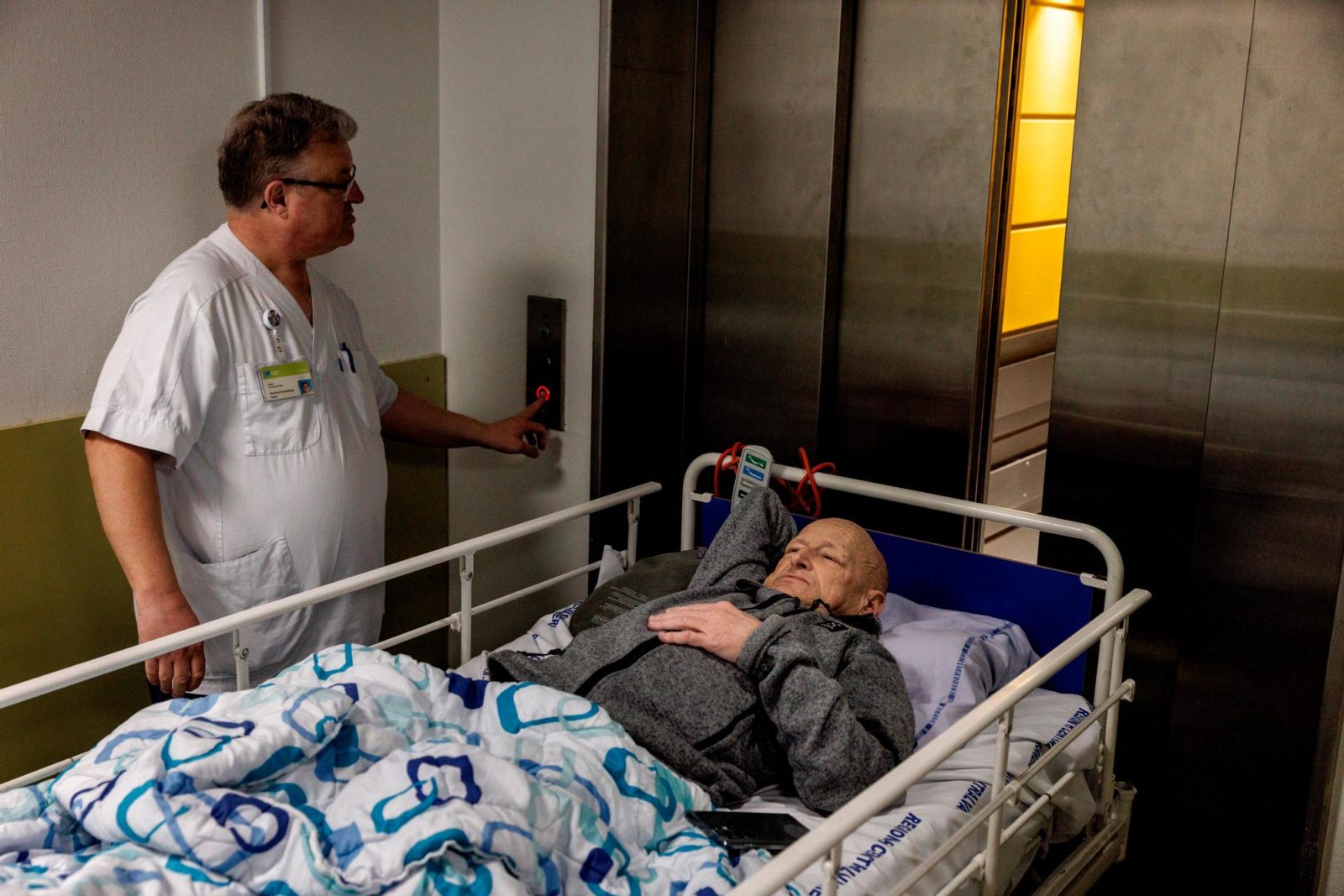
Photograph: Jacob Ehrbahn
The Worst Scenario
After a few frustrating days of waiting, Niels finally gets the CT scan he requested. It takes place in the hospital basement.
»Hello, sir«, says the radiologist. »Is this Niels Abrahamsen?«.
»Yes, what’s left of me«, Niels replies.
The radiologist looks at his file, calls him »an experienced gentleman«, and reads out his social security number:
»That’s correct. Mozart’s birthday«, says Niels.
He performs stretching exercises against the machine before lying down on the bed and being rolled into the scanner tube.
»Soon I’ll find out if it’s the worst scenario. If the cancer has gone wild. Or if it’s just fluid accumulation«, he says when he gets back to his room.
After rinsing his nose, he lies down with a music magazine in bed while Pink Floyd’s music washes over him. The next day, Niels is informed that the cancer has spread. He is offered a place at a hospice facility, which he accepts.
Where the Water Shines Like Gold
Just before midnight, the night nurse assesses that René doesn’t have much time left. She calls Mette, who, along with her husband, arrives at the hospital and sits by her uncle’s bed. René’s breathing rattles slightly, but otherwise, the room is quiet, with only a single lamp lit.
»There’s not much left of you«, says Mette, stroking his bony hand.
When the nurse called, René was restless. But as soon as he heard Mette’s voice, he calmed down. She feels his feet. One of the first signs of the body’s systems shutting down is that the blood is drawn to the central organs, causing the feet and hands to become cold.
»You’re still nicely warm«, she says.
A few days ago, they talked about the funeral. Mette suggested that René’s ashes be scattered over the sea at the sandbank where he used to fish.
»So, you’ll be out there when we swim and sail«, she said. René liked the idea.
She reminds him again. She tells him to imagine fishing at sunrise – the water shimmering like gold.
»And you’re in your boat sailing towards the sun«, she says.
Time passes in silence. René’s breathing is bubbling and rasping, but behind his chest, his heart is still pounding hard. He has trouble letting go, Mette thinks.
»Yesterday he said he would miss all of us«,
René Damgaard dies just after sunrise at 05:57. Afterwards, he lies peacefully in bed with a slight crooked smile. The morning light shines into the room, but behind René’s eyes, there is darkness.
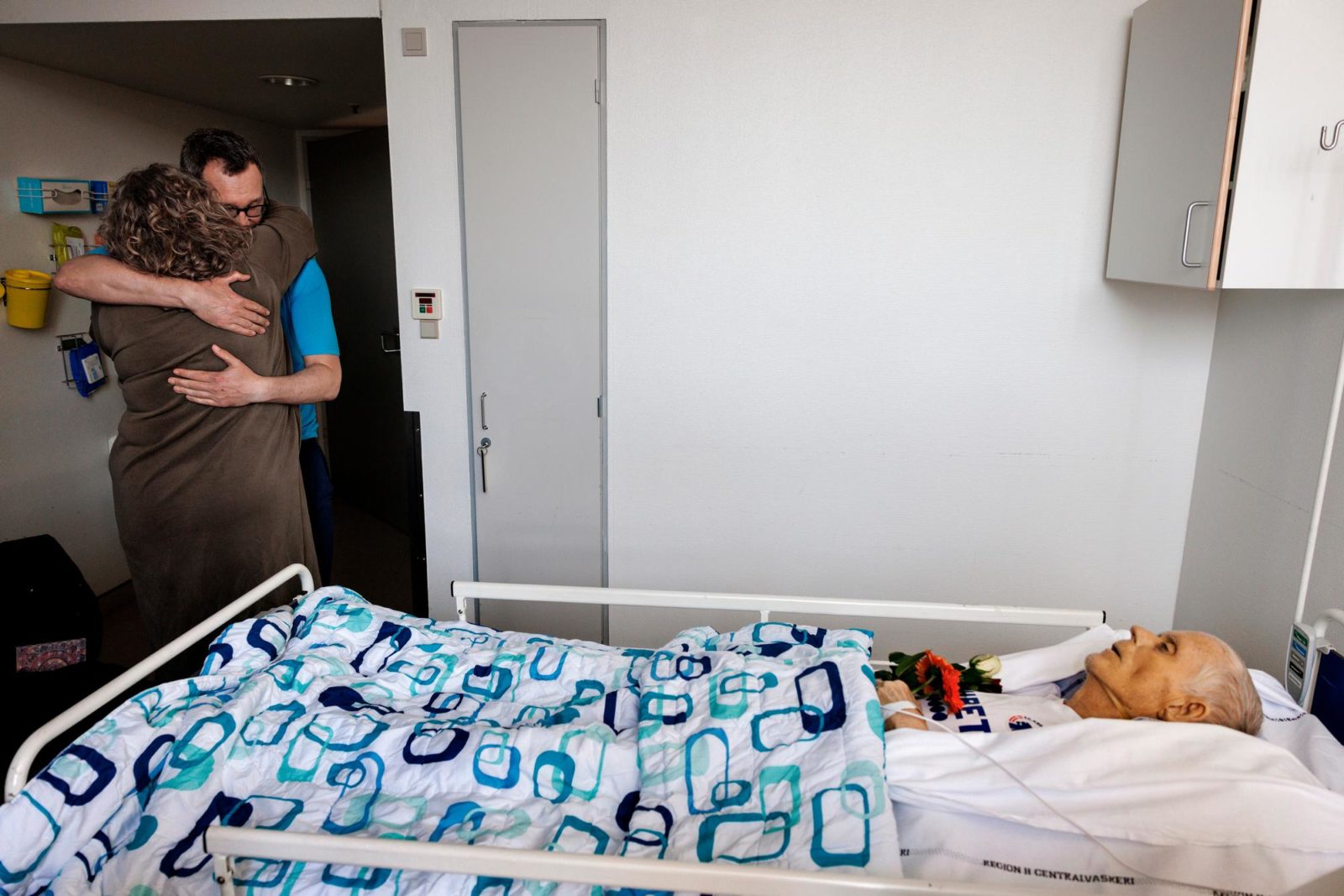
Photograph: Jacob Ehrbahn
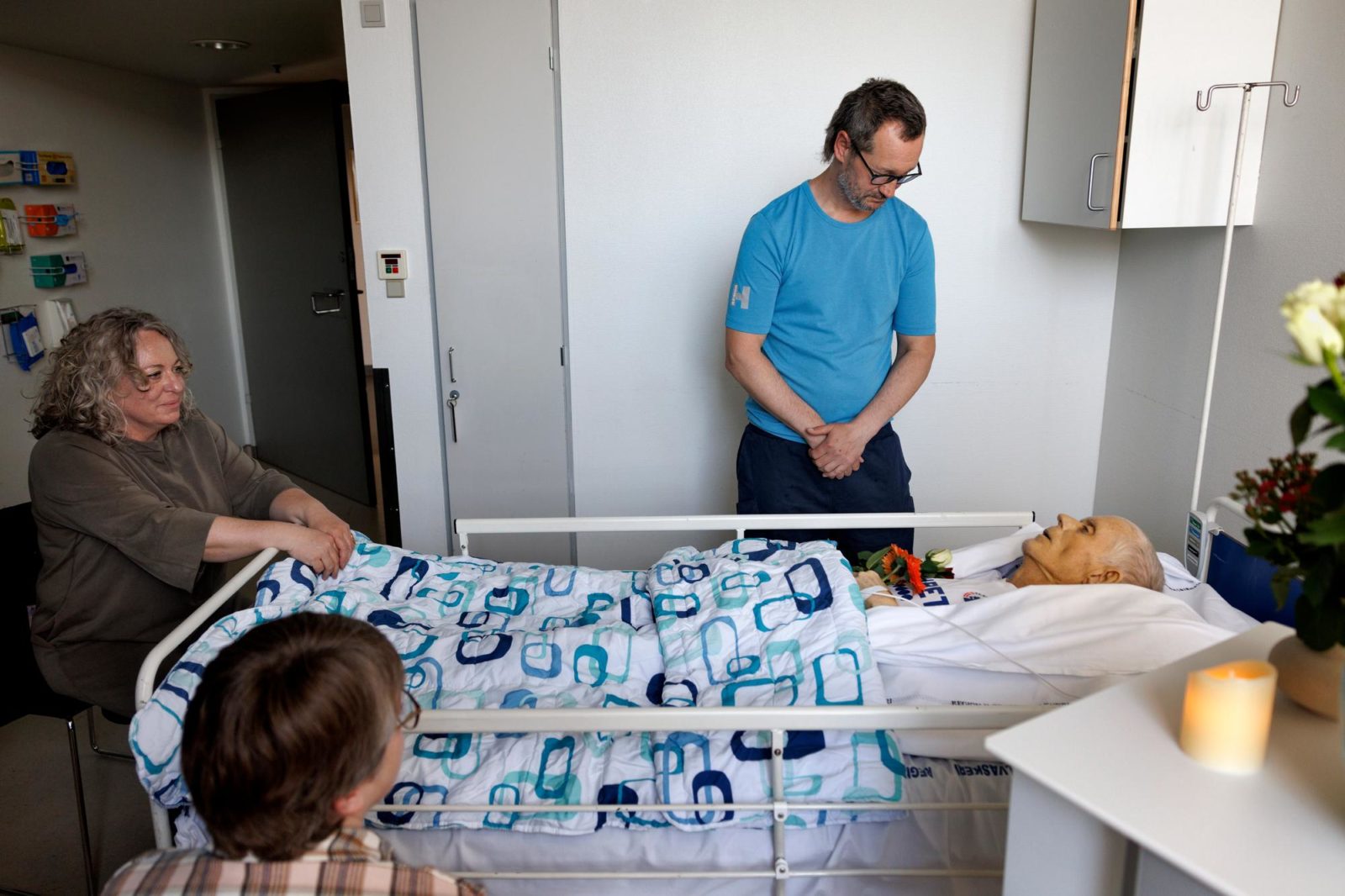
Photograph: Jacob Ehrbahn
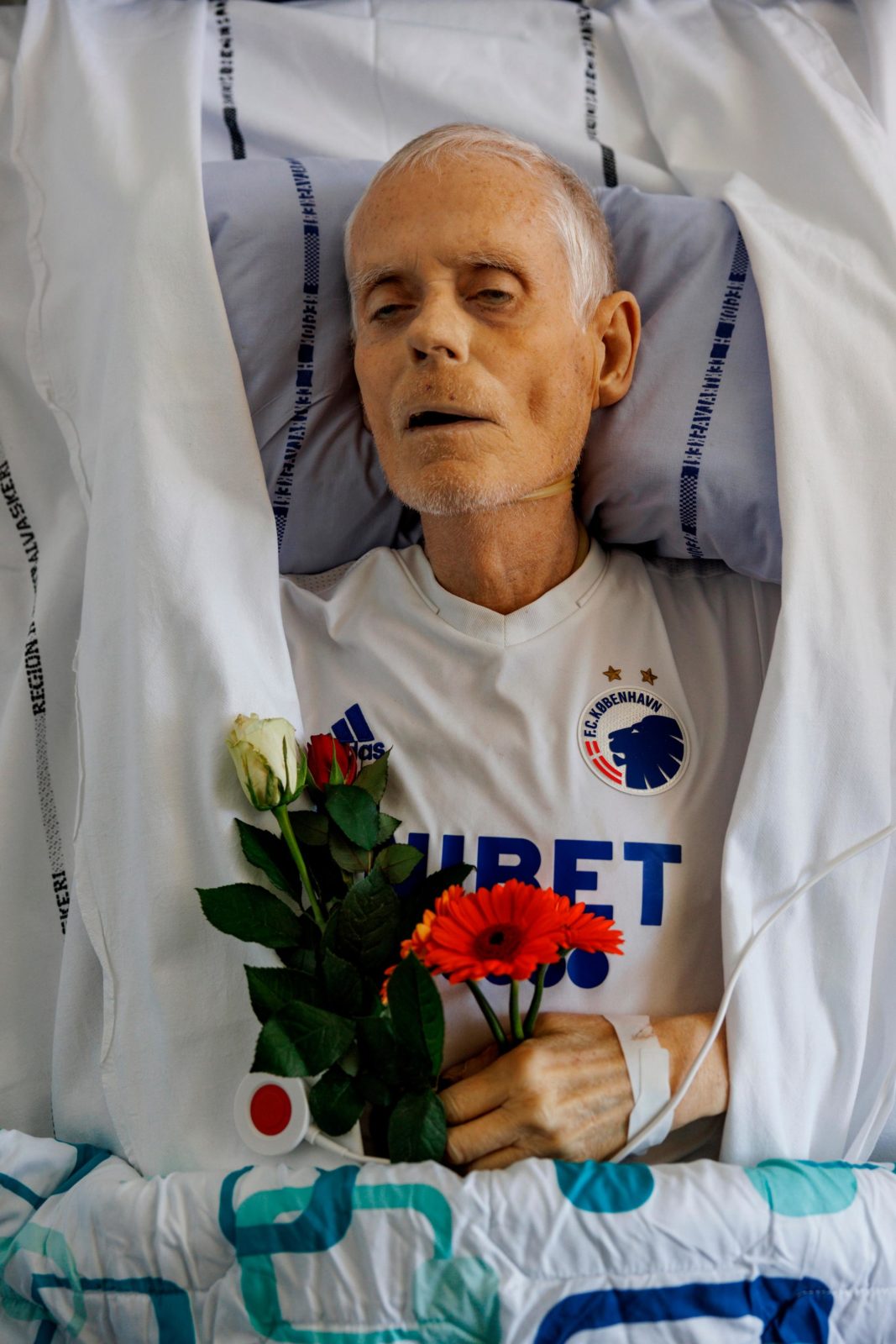
Photograph: Jacob Ehrbahn
Dr. Johan Randén stops by to say goodbye before René is taken away. He stands for a long time, looking at René with his head bowed.
»He was a wonderful man«, he says.
Mette cries as she hugs the doctor.
»You have been so fantastic«, she says.
Mette’s sister has also arrived, and they stand side by side as the porter takes René to the chapel. He has been dressed in his Football Club København jersey. Between his hands, he holds roses and gerberas.
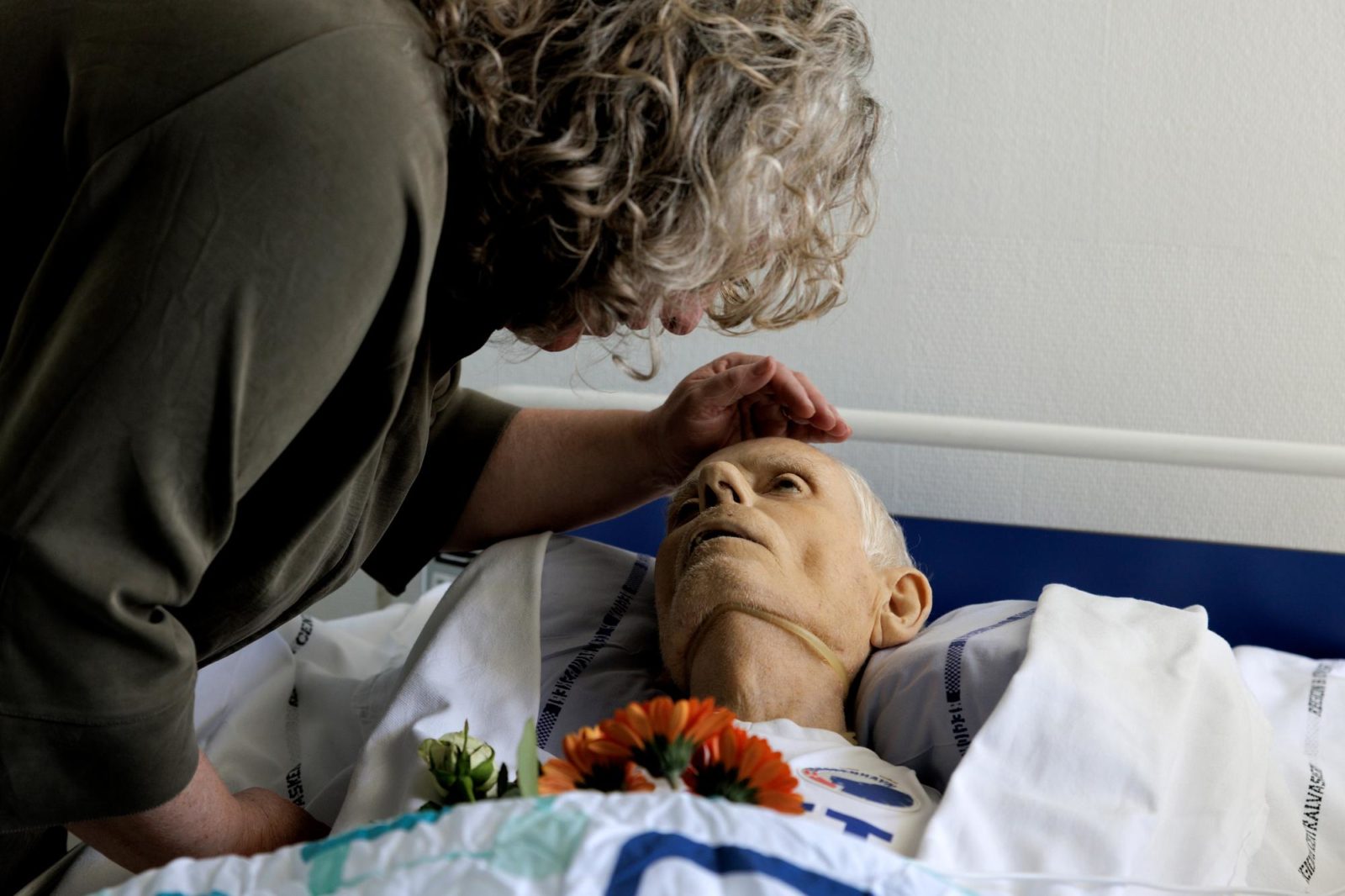
Photograph: Jacob Ehrbahn
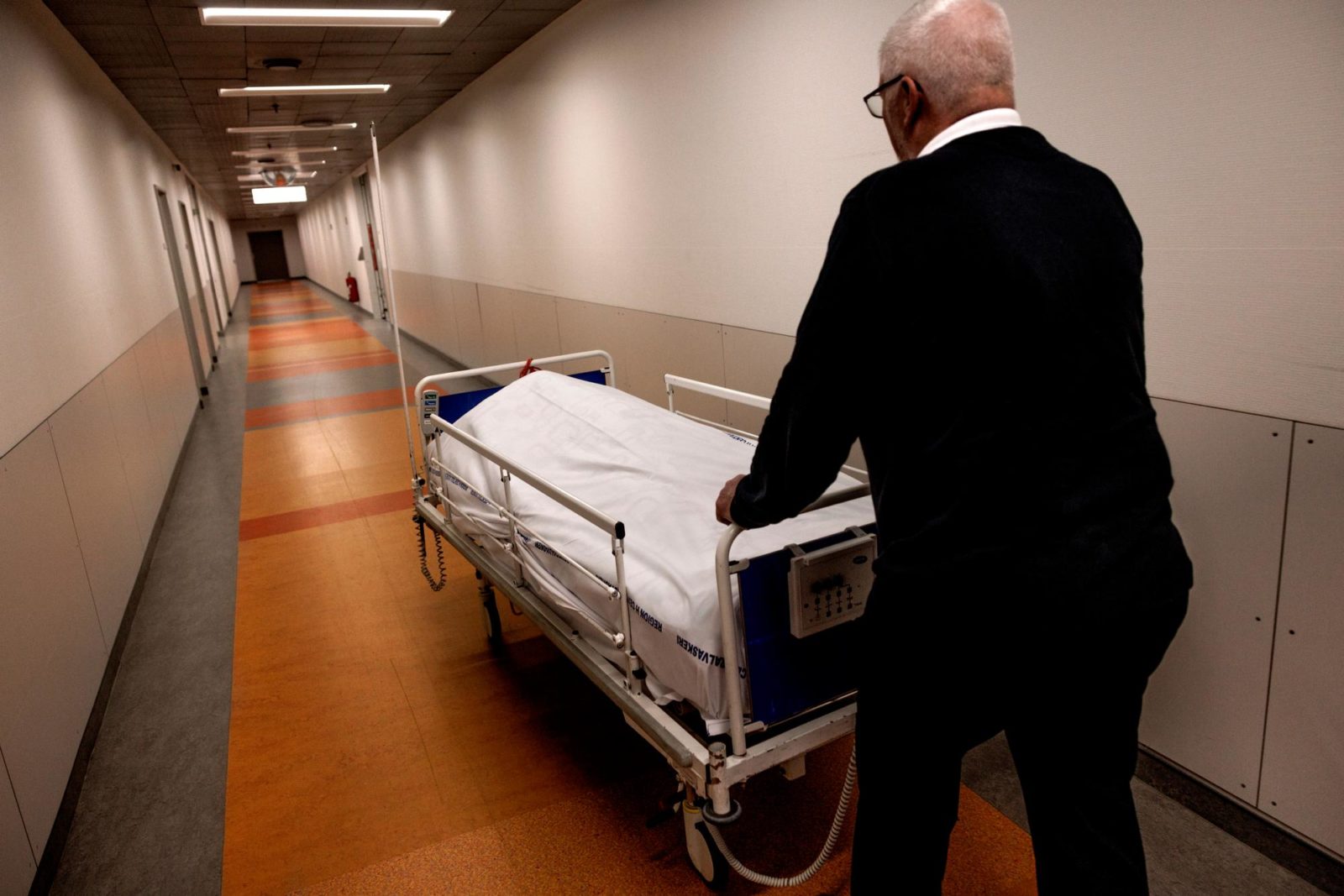
Photograph: Jacob Ehrbahn
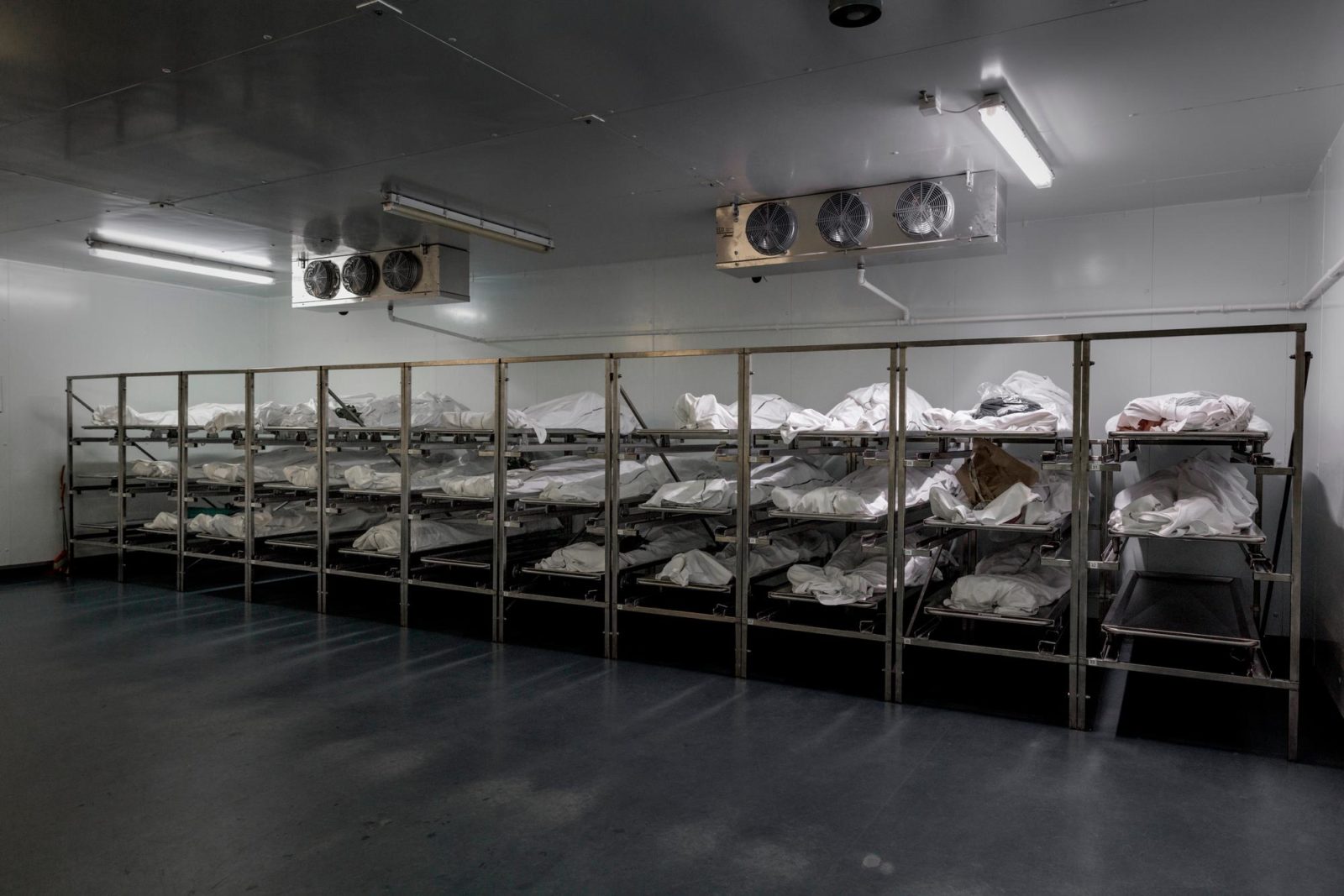
Photograph: Jacob Ehrbahn
René Damgaard was buried on May 15th.
Niels Abrahamsen died at the hospice on May 31st.
Liv Simonsen has returned home after a stay at the hospice.
Further Credits:
- Photojournalist, Jacob Ehrbahn
- Digital editor: Karina Kofoed
- Editor, Peter Schøler
- Editor, Christian Ilsøe
- Head of Digital Storytelling: Johannes Skov Andersen
- Leading editor in chief, Christian Jensen





